#Greek ethnocentrism
Explore tagged Tumblr posts
Text
Writing References: World-Building
20 Questions ⚜ 100 Words for World-building
Basics: World-building ⚜ Places ⚜ Imagery ⚜ Setting
Exploring your Setting ⚜ Habitats ⚜ Kinds of Fantasy Worlds
Fantasy World-building ⚜ World-building Vocabulary
Worksheets: Magic & Rituals ⚜ Geography; World History; City; Fictional Plant ⚜ A General Template
Editing
Setting & Pacing Issues ⚜ Editing Your Own Novel
Writing Notes
Animal Culture ⚜ Autopsy ⚜ Alchemy ⚜ Ancient Wonders
Art: Elements ⚜ Principles ⚜ Photographs ⚜ Watercolour
Creating: Fictional Items ⚜ Fictional Poisons ⚜ Magic Systems
Cruise Ships ⚜ Dystopian World ⚜ Parts of a Castle
Culture ⚜ Culture Shock ⚜ Ethnocentrism & Cultural Relativism
Food: How to Describe ⚜ Lists ⚜ Cooking Basics ⚜ Herbs & Spices ⚜ Sauces ⚜ Wine-tasting ⚜ Aphrodisiacs ⚜ List of Aphrodisiacs ⚜ Food History ⚜ Cocktails ⚜ Literary Cocktails ⚜ Liqueurs ⚜ Uncommon Fruits & Vegetables
Greek Vases ⚜ Sapphire ⚜ Relics ⚜ Types of Castles
Hate ⚜ Love ⚜ Kinds of Love ⚜ The Physiology of Love
Mystical Objects ⚜ Talisman ⚜ Uncommon Magic Systems
Moon: Part 1 2 ⚜ Seasons: Autumn ⚜ Spring ⚜ Summer
Shapes of Symbols ⚜ Symbolism ⚜ Slang: 1930s
Symbolism: Of Colors Part 1 2 ⚜ Of Food ⚜ Of Storms
Topics List ⚜ Write Room Syndrome
Vocabulary
Agrostology ⚜ Allergy ⚜ Architecture ⚜ Baking ⚜ Biochemistry
Ecology ⚜ Esoteric ⚜ Gemology ⚜ Geology ⚜ Weather ⚜ Art
Editorial ⚜ Fashion ⚜ Latin Forensic ⚜ Law ⚜ Medieval
Psychology ⚜ Phylogenetics ⚜ Science ⚜ Zoology
More References: Plot ⚜ Character Development ⚜ Writing Resources PDFs
#writing reference#worldbuilding#setting#writing tips#writing advice#writeblr#dark academia#spilled ink#literature#writing prompt#creative writing#fiction#writers on tumblr#story#novel#light academia#writing resources#compilation requested by anon#will update every few weeks/months
5K notes
·
View notes
Text
About "formal quality" in art
Oasis Nadrama, 24/11/2024

[Illustration: Wojciech Siudmak]
The idea that art is measurable, that there are ontologically "good" and "bad" creations, is one rooted in a search for performance in the capitalist system of domination (also rooted in pressure for productivity, superiority, and, most of all, competition, all tied to capitalism too).
It's also absolutely impossible to objectively measure the quality of art because everyone has different, generally untold criteria. What will make a good movie for me differs of what makes a good movie for you; I may (for example) favour large shot and contemplative scenes, while you would prefer closer shots and sharp editing.
This idea of formal quality is also tied to a formatted, ethnocentric vision of the world. AESTHETICS ARE NOT APOLITICAL OR ACULTURAL, the appreciation for some shapes, lines, values or palettes comes directly from an entire (generally western) history defining and redefining beauty. For example, in most European countries as well as the USA, monochromatic or almost monochromatic arrays of colours are favoured as "sober, more classical, more mastered and more elegant". But this perception comes from the way the Renaissance built our conception of "absolute beauty" as devoid of colours: in the 15th and 16th centuries, artists looked back at ancient art and misunderstood Greek or Roman statues and architectures as pure white. While in reality, such monuments were generally colorful, variegated, psychedelic even!
A lot of things changed in my perspective and appreciation of art when I managed to detach myself from the idea cultural products ought to be "rated", and when I came to understand there's a variety of definitions of "beauty". I encourage you to do the same, to open your mind.
There are worlds of different aesthetics out there, universes even.
3 notes
·
View notes
Text
Herodotean Humor and Critique of Imperialism
"Another response to their historical situation and likewise an aspect of the competitiveness of both comedy and historiography is to showcase aggressive humour. One sure target of Aristophanes’ biting humour is those with intellectual pretentions, whether the sophists or others— whose familiarity to his audience made the humour all the more powerful. Herodotus likewise expects his audience to relish the humorous mockery of people who claim knowledge they don’t possess, whether Hecataeus in asserting divine ancestry at only sixteen generations’ remove (2.143), or the contemporary mapmakers who are deluded about the shape of the world (4.36). A picture emerges, then, of authors of both camps, historiographic and comedic, jousting and engaging with members of their intellectual community, a community either already familiar to their audiences, or soon made so by witty and stinging characterisations.
Aggressive, victimising humour involves outwitting and insulting one’s opponent. It shares targets across both genres, such as the tyrannical individual or group who abuses its power; and its serious monitory lessons are part of the educative tendency of both genres.40 Donald Lateiner focuses on premeditated insults, situating them in the context of the agonistic character of relations between Greek males in this period. Both genres reflect this aspect of Greek social relations, Aristophanes more intensively, the historians more rarely, and with the purpose of endowing certain characters and events with instructive vividness. Mark Mash in this volume analyses in detail a Herodotean staging of victimising humour and one-upmanship in the Ethiopian king’s response to the messengers from Cambyses. As Mash shows, the historian’s representation of this character’s use of competitive, victimising humour contributes to the Histories’ serious critique of imperialism.41 Humour serves to deflate intellectual presumptions or arrogant ethnocentrism or—even more arrogant—the drive to conquer others. For while Herodotus is in general terms a cultural relativist, there is a problem for him with the nomos of Persian imperialism (as with the drive for conquest that Herodotus reveals to be a key motivation of most human communities): in depriving others of political freedom, it negates their nomoi. The display of the Ethiopian king’s dexterous use of victimising humour is, then, a mise-en-abyme of the historian’s own use of a favourite tool of the Old Comedian.
A humorous trick can also be the means of provoking someone to reveal his character; and another historiographical narrative which exposes imperialism and greed, where the apparently weaker party triumphs, and a foreigner criticises the Persian king, is the humorous trick (ἀπάτην, 1.187.1) played by Herodotus’ Babylonian Queen Nitocris. To display—and memorialise (see next section)— the greed of some future conqueror of Babylon, and to take comeuppance on him, she sets her tomb high atop the main city gate, with an inscription inviting a future king to open it, should he need the money; but warning him otherwise to leave it alone. Undisturbed until Darius’ time, the tomb is opened, but Darius finds only a corpse and an inscription with the rebuke: ‘If you were not greedy of money and sordidly greedy of gain, you would not have opened the coffins of the dead’ (1.187.5). Triumph of the underdog—in this case, of a representative of victims of future imperialism—is a favourite scenario of comedy. Biting personal humour thus again becomes a serious means of resisting empire."
From the Introduction of Emily Baragwanath and Edith Foster (editors) to the collective volume Clio and Thalia. Attic Comedy and Historiography (2017), Histos Supplement 6, available on https://histos.org/documents/SV6.ComedyandHistoriography.pdf
2 notes
·
View notes
Text
Great post OP! Thank you so much.
I would like to add: it discourages actual research on the demographic you're siding with.
For example, when people were claiming Achilles and other Ancient Greek heroes were black because [insert long pseudohistorical theory and lots of jumping to conclusions about Mediterranean peoples], lots of people were quickly content to add these black characters in the Iliad and...that's it. People realised they could get mad at people for representing Ancient Greek stories with white casts and pressured to add black people (with no thought about Greek/Mediterranean people) but at no point did they have to question 1) their rigid ethnocentric and present-centric views of race. They could continue to consider race universal to every time period and place on earth, without having to do the work to realise race is a social construct and its perception changes depending on culture. Many of the people involved in that discourse on the supposedly anti-racist side were treating race as a biological truth.
And 2) it only results in an extremely surface-level change. If they want "diverse stories", now they could just change the race of a few characters and that's it, no need to keep thinking about it. It stops the reflection on why did we lack black characters in the acclaimed mythology and literature that our society values. It's saying "hey, let's keep telling the same European stories, let's keep using the same Eurocentric measurements for what's valuable and good and what isn't" and it stops the consideration of, you know, if we want more black characters in mythology, there's a myriad of black cultures with hundreds and thousands years of stories, mythologies, literature (oral or otherwise) and other art forms that we aren't paying attention to. The problem of not knowing any black mythological characters (and what that means about the society we grew up in) isn't solved by saying "ah yes I do, because Achilles was actually black" without ever considering that African and African diaspora mythologies and literatures are just as fascinating, and why our society has historically considered Greco-Roman cultures superior and has developed systems of evaluating how """good""" something is based on them.
The same thing goes for many other arts. For example when people were claiming Beethoven was black because his death mask shows the symptoms of how your face changes after you die. I completely understand the relief in being able to tell White people "look! Black people have collaborated in your history! Black people have created these art pieces that you value so much!" and thus... Black people make art as good as White people and prove that Black people are equal and deserve the same rights and respect. And all of that is great and again I don't blame anyone for needing this validation from White people (or whatever their oppressor group is) because that's what society builds us to do, but I'm afraid that in Internet discourse this has often just ended there, it hasn't developed past "Beethoven was actually black" into other, deeper questions like "why is upper-class European music the one we value above others? Why is this one the symbol of elegance?" and it doesn't seem to have motivated many people involved in the discourse to go and research African and African diaspora music styles. When they're incredibly diverse and I'm sure many people would love them! The instruments and rhythms are different and it can be very cool to hear new stuff that you haven't been exposed to before. And also even if you don't like the ones you find (because our taste is developed according to what we've been exposed to) you will have gained a deeper understanding of human diversity and cultures and the possibilities of human creativity.
A note because this is the Internet and we all know people like to read things with the worst faith interpretation possible: if you're a fanfic writer who writes Greek/Hellene characters from Greek mythology as black characters, I don't care, you do you. Art is one thing and you can interpret it as you want. Though a certain amount of respect for the original story is important when you're telling a story that is as culturally-relevant as this, art is always understood to be subjective and a reflection of the author. If you're claiming it's an objective historical fact, that's where you're wrong.
Anti-racist, feminist, labour, etc organizations (almost always) do all these reflections very well. My criticisms are directed at the people who spread this pseudohistory and don't care that it's fake.
Lastly, I would like to add: if you don't look at facts, how do you know that what you feel is true is actually true? Do you think that conservatives don't feel that racialized people lesser, do you think they don't feel that women exist just to take care of men, do you think they don't feel that disabilities make you less worthy of rights? And does society not raise us all with such ideas all around us? If you don't care about facts, how do you know that what others feel is true is actually wrong, but what you feel is true is actually right?
I get variations on this comment on my post about history misinformation all the time: "why does it matter?" Why does it matter that people believe falsehoods about history? Why does it matter if people spread history misinformation? Why does it matter if people on tumblr believe that those bronze dodecahedra were used for knitting, or that Persephone had a daughter named Mespyrian? It's not the kind of misinformation that actually hurts people, like anti-vaxx propaganda or climate change denial. It doesn't hurt anyone to believe something false about the past.
Which, one, thanks for letting me know on my post that you think my job doesn't matter and what I do is pointless, if it doesn't really matter if we know the truth or make up lies about history because lies don't hurt anyone. But two, there are lots of reasons that it matters.
It encourages us to distrust historians when they talk about other aspects of history. You might think it's harmless to believe that Pharaoh Hatshepsut was trans. It's less harmless when you're espousing that the Holocaust wasn't really about Jews because the Nazis "came for trans people first." You might think it's harmless to believe that the French royalty of Versailles pooped and urinated on the floor of the palace all the time, because they were asshole rich people anyway, who cares, we hate the rich here; it's rather less harmless when you decide that the USSR was the communist ideal and Good, Actually, and that reports of its genocidal oppression are actually lies.
It encourages anti-intellectualism in other areas of scholarship. Deciding based on your own gut that the experts don't know what they're talking about and are either too stupid to realize the truth, or maliciously hiding the truth, is how you get to anti-vaxxers and climate change denial. It is also how you come to discount housing-first solutions for homelessness or the idea that long-term sustained weight loss is both biologically unlikely and health-wise unnecessary for the majority of fat people - because they conflict with what you feel should be true. Believing what you want to be true about history, because you want to believe it, and discounting fact-based corrections because you don't want them to be true, can then bleed over into how you approach other sociological and scientific topics.
How we think about history informs how we think about the present. A lot of people want certain things to be true - this famous person from history was gay or trans, this sexist story was actually feminist in its origin - because we want proof that gay people, trans people, and women deserve to be respected, and this gives evidence to prove we once were and deserve to be. But let me tell you a different story: on Thanksgiving of 2016, I was at a family friend's house and listening to their drunk conservative relative rant, and he told me, confidently, that the Roman Empire fell because they instituted universal healthcare, which was proof that Obama was destroying America. Of course that's nonsense. But projecting what we think is true about the world back onto history, and then using that as recursive proof that that is how the world is... is shoddy scholarship, and gets used for topics you don't agree with just as much as the ones you do. We should not be encouraging this, because our politics should be informed by the truth and material reality, not how we wish the past proved us right.
It frequently reinforces "Good vs. Bad" dichotomies that are at best unhelpful and at worst victim-blaming. A very common thread of historical misinformation on tumblr is about the innocence or benevolence of oppressed groups, slandered by oppressors who were far worse. This very frequently has truth to it - but makes the lies hard to separate out. It often simplifies the narrative, and implies that the reason that colonialism and oppression were bad was because the victims were Good and didn't deserve it... not because colonialism and oppression are bad. You see this sometimes with radical feminist mother goddess Neolithic feminist utopia stuff, but you also see it a lot regarding Native American and African history. I have seen people earnestly argue that Aztecs did not practice human sacrifice, that that was a lie made up by the Spanish to slander them. That is not true. Human sacrifice was part of Aztec, Maya, and many Central American war/religious practices. They are significantly more complex than often presented, and came from a captive-based system of warfare that significantly reduced the number of people who got killed in war compared to European styles of war that primarily killed people on the battlefield rather than taking them captive for sacrifice... but the human sacrifice was real and did happen. This can often come off with the implications of a 'noble savage' or an 'innocent victim' that implies that the bad things the Spanish conquistadors did were bad because the victims were innocent or good. This is a very easy trap to fall into; if the victims were good, they didn't deserve it. Right? This logic is dangerous when you are presented with a person or group who did something bad... you're caught in a bind. Did they deserve their injustice or oppression because they did something bad? This kind of logic drives a lot of transphobia, homophobia, racism, and defenses of Kyle Rittenhouse today. The answer to a colonialist logic of "The Aztecs deserved to be conquered because they did human sacrifice and that's bad" is not "The Aztecs didn't do human sacrifice actually, that's just Spanish propaganda" (which is a lie) it should be "We Americans do human sacrifice all the god damn time with our forever wars in the Middle East, we just don't call it that. We use bullets and bombs rather than obsidian knives but we kill way, way more people in the name of our country. What does that make us? Maybe genocide is not okay regardless of if you think the people are weird and scary." It becomes hard to square your ethics of the Innocent Victim and Lying Perpetrator when you see real, complicated, individual-level and group-level interactions, where no group is made up of members who are all completely pure and good, and they don't deserve to be oppressed anyway.
It makes you an unwitting tool of the oppressor. The favorite, favorite allegation transphobes level at trans people, and conservatives at queer people, is that we're lying to push the Gay Agenda. We're liars or deluded fools. If you say something about queer or trans history that's easy to debunk as false, you have permanently hurt your credibility - and the cause of queer history. It makes you easy to write off as a liar or a deluded fool who needs misinformation to make your case. If you say Louisa May Alcott was trans, that's easy to counter with "there is literally no evidence of that, and lots of evidence that she was fine being a woman," and instantly tanks your credibility going forward, so when you then say James Barry was trans and push back against a novel or biopic that treats James Barry as a woman, you get "you don't know what you're talking about, didn't you say Louisa May Alcott was trans too?" TERFs love to call trans people liars - do not hand them ammunition, not even a single bullet. Make sure you can back up what you say with facts and evidence. This is true of homophobes, of racists, of sexists. Be confident of your facts, and have facts to give to the hopeful and questioning learners who you are relating this story to, or the bigots who you are telling off, because misinformation can only hurt you and your cause.
It makes the queer, female, POC, or other marginalized listeners hurt, sad, and betrayed when something they thought was a reflection of their own experiences turns out not to be real. This is a good response to a performance art piece purporting to tell a real story of gay WWI soldiers, until the author revealed it as fiction. Why would you want to set yourself up for disappointment like that? Why would you want to risk inflicting that disappointment and betrayal on anyone else?
It makes it harder to learn the actual truth.
Historical misinformation has consequences, and those consequences are best avoided - by checking your facts, citing your sources, and taking the time and effort to make sure you are actually telling the truth.
15K notes
·
View notes
Text
Debunking Misconceptions: The Paris Olympics Opening Ceremony and Dionysus Celebration
I’m not sure who needs to hear this, but here we go. To whom it may concern, Careful now! Your ethnocentrism is showing, and it’s not a good look. No, Paris wasn’t mocking Christianity and y’all need to calm down. Stop making unfounded claims to stoke fear and anger to create attacks that aren’t happening like wars on Christmas. It was a celebration of Dionysus, the Greek God of wine,…

View On WordPress
0 notes
Text
This is what it feels like whenever I see people judging myths with an ethnocentric opinion without regard for the history of where these myths came from, how they were shaped, or the historical value of what they mean. So this is what it reads like to me whenever I see someone judging a Greek myth based on their very limited understanding of it:
Ancient Greek person: This person in my ancestral bloodline was amazing! My grandfather told me he did so many incredible things no human thought was possible, like fighting monsters! My whole family assumes he was a child of Zeus because how else would he have been so blessed?! We're gonna make songs and stories praising his name so the people around us know he was a hero and a demigod! We're gonna venerate him as an ancestor and hope history never forgets his name or the place where he came from! We're gonna immortalize our family through him and let the world know lord Zeus still protects us because we are a part of him!
Modern people reading that same story after it survived thousands of years and is now a well known myth: Yet another demigod? Zeus puts his dick in everything doesn't he? What a POS!
Me:



#hellenic polytheism#hellenic deities#hellenic paganism#lord zeus#zeusdeity#zeusreligion#zeus worship#zeus positive
638 notes
·
View notes
Text
Molly Levine reviews and criticizes the “post-colonial” book of Phiroze Vasunia “The Gift of the Nile: Hellenizing Egypt from Aeschylus to Alexander”

The Gift of the Nile: Hellenizing Egypt from Aeschylus to Alexander. Classics and Contemporary Thought, 8
Phiroze Vasunia, The gift of the Nile : hellenizing Egypt from Aeschylus to Alexander. Classics and contemporary thought ; 8. Berkeley: University of California Press, 2001. xiv, 346 pages : illustrations ; 24 cm.. ISBN 0520228200 $45.00.
Review by
Molly Levine, Howard University.
In the past decade, considerable scholarly attention has focused on the evidence for ancient traditions regarding Greek indebtedness to Egypt. Attention has focused especially on the texts adduced by Martin Bernal’s Black Athena (= BA) texts which Bernal used to support his hypothesis of an “Ancient Model” of early, “massive” contacts between Egypt and Greece.1 Phiroze Vasunia’s The Gift of the Nile: Hellenizing Egypt from Aeschylus to Alexander, while not explicitly conceived as a response to Bernal, remains in a very real sense just that. Vasunia examines many of the same texts as Bernal, but from a different perspective. The avowed goal of his book is “to examine a particular case of ethnocentrism which is localized to the fifth and fourth centuries B.C.E., to inquire into its methods and its grammar, and to investigate the factors that motivated it, the ideologies that sustained it, and the real and sometimes devastating uses to which it could be put by Greeks” (17).
In focusing only on what the ancient Greek texts on Egypt tell us about the Greeks, Vasunia heeds the advice of Edith Hall, who argued against Bernal that Greek traditions on contacts between Greece, Egypt, and the Levant cannot and should not be used as evidence for historical realities in the Bronze Age. Rather, Greek depictions of “Others”, including Egypt and Egyptians, should be read only for what they can tell us about the contemporary ethnic world view of the ancient Greeks themselves.2
Like Bernal, Vasunia insists that Greek discourse on Egypt is the source of many contemporary themes that can be traced back through the European Renaissance and the Enlightenment (17-18). But with the exception of a useful, though brief, summary of the historical relations between Greece and Egypt during the Egyptian Late Period from 664-332 B.C.E. (20-29), Vasunia uses historical materials primarily as a ‘reality check’ for his broader interpretation (19-20), and is “less concerned than Bernal with establishing historical facts” as such, and instead focuses on “representation, rhetoric, and the politics of literature” (17).
A few examples can illuminate some critical differences in the approaches of these two scholars to the question of how to read Greek texts on Egypt. For Vasunia, Isocrates’ Busiris, a text to which Bernal devoted several pages (BA I, 103-108) and Vasunia an entire chapter (“Reading Isocrates Busiris,” 183-215), rather than affirming a tradition of Greek cultural indebtedness to Egypt, “is largely orthodox in its reinscription of the other…[perpetuating] the cultural stereotype of Egyptians as xenophobic and inclined to human sacrifice” (200). Both Bernal and Vasunia read the speech against its contemporary fourth-century political and intellectual context and specifically link it to Isocrates’ rivalry with Plato. But Bernal, while admitting that the speech was on one level a rhetorical tour de force, insists that “to be convincing, the speech had to appeal to conventional wisdom” on the cultural indebtedness of Greece to Egypt (BA I, 103). Vasunia places much more emphasis on genre (an area that Bernal was criticized for slighting), arguing that one cannot read Busiris without taking into account the complex nature of its parody that “takes a fixed tradition and reasserts it, though in the guise reversing or altering it” (207). So, contra Bernal, Vasunia’s Isocrates emerges as no unqualified admirer of Busiris and/or Egyptian traditions.
Or, in another example, to Vasunia’s question “Why do both Plato and Isocrates appear so ready to say that Greek philosophers and wise men such as Solon and Pythagoras visited Egypt?” (229), Bernal would respond because they, in fact, visited Egypt (BA I, 108). Not so, says Vasunia, who eschews the historical question (229, 242; cf. 232, 234) and prefers to focus on what these stories say about the “cultural anxieties” of fourth-century Greeks for whom “to discover one’s wisdom along the shores of the Nile is not only to make Egypt a theatre where one may represent oneself to one’s own, but also to betray the anxious symptoms of a lack” (242).
But the difference between the treatments of many of the same texts by the two authors goes much deeper. As befits a book published in a series that “seeks to establish connections between specialized research on Greco-Roman antiquity and broader inquiry in the humanities, arts, and social sciences” (vii), Vasunia applies contemporary post-colonial criticism to ancient literature using a teleological scheme that posits “a relationship between knowledge and power” (11), the “claim of discourse driving Empire” (249). In this view, “European study of non-European cultures has led to colonial hegemony and political control … discourses that seem the most benign can come to have a crucial influence on mechanisms of authority and command” (12). This means that Vasunia reads fourth and fifth century Greek texts on Egypt not simply as reflections of contemporary concerns but as harbingers of future events. For Bernal, myth preserved the long-forgotten tracks of real historical events in the past. But in Vasunia’s post-colonial reading, cultural myths pave the way for real historical events in the future, in this case the fourth-century conquest and subjugation of Egypt by Alexander the Great in the name of Hellenism, an event that, for Vasunia, is “a tangible and material realization” of the politics that informed Greek representations of Egypt in the fifth and fourth centuries B.C.E. (248, cf. 248-49, 287). In this view, no matter how heterogenous these texts on Egypt are, they contain common elements that “recur and intersect across the works of authors,” much like British writings on India from 1600-1800 (9-10). According to Vasunia, “no Greek reference to Egypt in the years before Alexander is innocent of this gross fact…, however sentimental the reference may appear, however distant it may seem from Alexander’s invasion and the subsequent rule by the Ptolemies” (6). While acknowledging the possibility of anachronism and “genuine differences” between the classical Greek world and the age of modern imperialism, Vasunia claims that “taken together, Herodotus, Homer, Aristotle, and other Greeks were a defining part of the ideological background that shaped Alexander’s conquest of Egypt” (12, cf. 32).
The structure of Vasunia’s book parallels its “teleological” thesis. A series of chapters on major prooftexts for his argument — Aeschylus’ Suppliants; Euripides’ Helen; Herodotus Book II; Isocrates Busiris; and passages from Plato’s Phaedrus, Timaeus, and Critias — culminates in a final chapter on Alexander’s conquest and occupation of Egypt. The book also includes a useful appendix of translated fragments from Greek historians on Egypt from Hecataeus (ca. 500 B.C.E.) through 332 B.C.E. and a rich, well chosen bibliography.
Each chapter applies post-colonial theory to specific ancient texts, with varying degrees of success. For example, in Chapter One on “The Tragic Egyptian,” Vasunia argues that Aeschylus’ Suppliants and Euripides’ Helen configure “issues of erotics, desire, and race…in relation to death” (12), in anticipation of Edward Said’s characterization of the western view of the Orient as hypersexual and fecund ( Orientalism, epigraph 33, and discussion 35-36). Egyptian males in the Suppliants and Helen are portrayed as hypersexed suitors pursuing a deadly marriage with the Egyptian Danaids or the Greek Helen in two tragedies that stereotypically identify Egypt with death and depict the aggressive desire of male Egyptians as deadly. By Vasunia’s reading, in the discourse of Athenian tragedy, “the way to preserve the social polity and to prevent ethnic contamination is to make abhorrent the union between these men and women” (74).
There is little to quarrel with in Vasunia’s argument that Athenian drama uses Egyptian men as “vehicles for the exploration and realization of Greek men’s covert desires”(38), but his attempt to distinguish his two Egyptian tragedies from the entire corpus of Athenian tragedy is not entirely persuasive. Vasunia’s tragic Egyptian weddings may be a matter of the ethnic tail wagging the dog of gender, piggybacking on the more universal Greek idea of sex and marriage as fraught with mortal danger, especially for women. As for Egypt as a sign for alterity in tragedy, Vasunia himself points out that of the extant tragedies only the Helen has Egypt as its setting (59 n.68), and in the tragic theater one need look no farther abroad than Thebes for the “Other” city in which Athenian social conflicts and repressed psychosexual desires can be acted out.3 Although apparently sensitive to these problems, Vasunia’s suggested solutions are unsatisfying. For example, Aeschylus’ Suppliants is distinguished from some of the other plays which conflate marriage with death for the female “insofar as it dramatizes in detail the events that lead to a wedding and the married life rather than the experiences of individuals who are already married” (54). What of tragic brides such as Iphigenia and Antigone, to name but a few?
A major strength of Vasunia’s methodology lies in his practice of interrogating Greek texts from a cross-cultural perspective, introducing comparative Egyptian material to present illuminating contrasts between the historical reality of Egypt in the 5th and 4th centuries B.C.E. and the Greek representations of Egypt from the same period. Vasunia does well to remind us again and again that the period of Persian rule that saw the most intense interaction of Greeks with Egypt is for various reasons remarkably absent in the Greek texts (e.g., 7, 244). In more specific examples, the author reminds us that although tragedy forecloses any possibility of a union between Greek and Egyptian, in fact mixed unions between Egyptians and Greeks were occurring in Egyptian towns such as Naucratis (34); a discussion of the political conceptualization of Greek space in Herodotus is offset by an illuminating treatment of the Egyptians’ conceptualization of their own space with the pharaoh’s architectural projects seen not as a Herodotean “transgression and violation” but as an “extension and replication” of natural boundaries (103-109); a section on Egyptian time argues for a more “complicated and interesting” ancient Egyptian approach to their own history than that suggested by Herodotus’ presentation of Egyptian temporality as “flat and static” in contrast to the dynamism of Greek time (126-127).
The same practice produces what is perhaps the most illuminating section of the book, an extended comparison between Greek (Platonic) and Egyptian conceptions of the written word in Chapter IV “Writing Egyptian Writing” (151-182). Here Vasunia shows that although Plato uses the Egyptian story of Theuth ( Phaedrus 274c-275b) to express his own anxieties about writing, in reality, Egyptian notions of orality and writing were radically different from the Platonic view. The Platonic view of language and meaning as distinct entities with the consequent danger of distortions between words and ideas contrasts with the Egyptian notion of “‘direct signification’ where the congruence between signs and things was maintained” (174-75). Subverting another Platonic distinction, he argues, is the Egyptian belief that the spoken word is often an extension of the written word, coterminous with writing, rather than an alternative to it (171). Furthermore, the nature of Egyptian monumental inscriptions subvert the Herodotean identification of writing and autocracy by often co-opting the reader into enacting the role of king and identifying with him. “Thus, where Greek sources point to tyrannical power, the Egyptian inscriptions do not quite correspond to the Greek implications of tyranny… The subjectivity enacted here is neither fully democratic, nor fully autocratic, but it indicates a self-identification on the part of the reader that the Greek sources fail adequately to grasp” (172).
Vasunia’s two chapters on Herodotus’ representation of Egyptian space and time impressively demonstrate this author’s deftness in laying bare the political implications of seemingly neutral abstractions and going beyond the “simple binarism” implicit in notions of self and other. In Vasunia’s fascinating discussion, Herodotus’ narrative with its series of Egyptian rulers who alter the country’s landscape framing space “to a geometrical design” and investing it “with the power of kings” (81) and thereby enslaving its inhabitants is read against the “larger ethnographic differentiation where the despotism and tyranny of barbarian lands stands in contrast to the freedom and openness of many Greek city-states” (77). In a subsequent chapter he argues that Herodotus represents Egyptian temporality as ancient and static so as to offer a contrast to his Athenian readers with the “present-oriented temporality of the Athenian democracy” and thus to construct an implicit contrast between two political systems: democracy and autocracy (112).
Vasunia’s book is brilliant and exciting, but his fidelity to the post-colonial mantra that “Empire follows Art” (11) too often seems excessive. So, for example, Herodotus sets Egypt under a masterful “all-encompassing panoptic gaze” presented in a discourse that serves “to naturalize the space of Egypt by flattening and denuding it” in a landscape “measured, packaged, quantified, stripped of its inhabitants, and lacking any aesthetic flavor” (101-103). Measuring the length and breadth of its space, the authoritative voice of Herodotus dominates the space and time of the country while putting it on display, winning the trust of his reader by quoting Egyptian archives, referring to interviews, invoking sources in a variety of ways, using a “rhetoric of mastery” that sets the author as the authoritative translator and observer of a non-Greek culture for his Greek reader (100-101; cf. 13) and which parallels the mastery over space and time that he ascribes to the pharaohs in his narrative (103, 13). By these stringent standards, almost every act of writing is an act of imperialism and even the most innocent Baedeker, not to speak of Vasunia’s own text, commits a “rhetoric of domination” over its subject. Perhaps the only difference is that most authors will not have an Alexander or Napoleon as yet unborn waiting in the wings to actualize their rhetoric, if indeed writing has as much power as post-colonial critics would impute.
Although Vasunia promises “not to reduce all my observations to the charge of ethnocentrism” (9) of which all ancient texts are guilty, his bottom line can be just that. For example, Isocrates’ Busiris is “a text that seldom troubles to grasp the realities of contemporary Egypt, that treats and handles ethnocentrism as if it were anti-ethnocentrism, that reeks of both condescension and arrogance, that retards rather than advances ethnic understanding, and that ultimately takes for granted the most pernicious of cultural stereotypes” (215). Plato’s use of Egypt as a vehicle for his own beliefs about language is tendentious and ethnocentric (181). Furthermore, Plato, like Hegel, is Eurocentric and his philosophical use of Egypt is a “strategy” for the containment of the older civilization (246). More generally, the Greek texts are faulted for “their failure to arrive at a sympathetic understanding of the otherness of Egyptian culture on its own terms,” as symptomized by “the neglect of Greek intellectuals to learn foreign languages” (182).4 In short, “the Greek treatment of Egypt is both deceptive and self-serving” (244).
Pronouncements such as these leave the reader wondering if Vasunia is perhaps asking too much of these ancient texts, judging them by modern sensibilities. We are not helped by the fact that Vasunia never explicitly lays out how an alternative text could or should read, while writing as if such an alternative were possible in antiquity. Was there a better, more ‘moral’ way for a writer like Herodotus to tell his readers about the Egyptians than to measure, count, and interview Egyptian priests? And if so what was it? Vasunia’s ancient Greeks are imperialists, his ancient Egyptian colonized subjects, long before Alexander set foot on the shores of Egypt.
Indeed, Vasunia’s own account of the motives and actions of Alexander in Egypt seems to undercut his thesis to some extent. It is asking a lot of a reader to accept an argument in which a historical event is anticipated by two hundred years of disparate texts without worrying about the “post hoc propter hoc” fallacy: Alexander conquered many peoples other than the Egyptians. Pace Vasunia, it is extraordinarily difficult to make a persuasive case for the extent to which Alexander’s invasion of Egypt was driven by his exposure to the Greek discourse on Egypt. In Alexander’s case, in fact, western Asia, the site of his hero Achilles’ exploits and of the more recent Persian Wars, seems, if anywhere, a more likely site for the intersection of literature and empire. Alexander’s detour to the South in the midst of his Persian campaign can be explained either by strategic reasons (Peter Green) or ideological motives (Vasunia) or both. His conquest of the country is a fact. But even Vasunia’s account of Alexander’s actions in Egypt ranges over the familiar terrain of the sensitivity and respect shown by Alexander to native Egyptian traditions (266), his foundation of a heterogeneous Alexandria, and his intellectual curiosity engendered by centuries of Greek speculation about the source of the Nile and the causes of its annual flooding. Surely, if the impetus for this conquest was Greek discourse on Egypt, this same discourse must be given its due in the conqueror’s remarkably sympathetic brand of imperialism in Egypt and his respectful treatment of the Egyptians. And so we are left with the question of how “pernicious” or “devastating” Greek discourse on Egypt actually was.
As for style, again recalling Bernal, Vasunia’s closely argued book goes down like a dense chocolate cake: so rich in ideas as to cause indigestion unless taken in small monitored portions, but certainly tempting. On occasion, the author gets carried away by his own rhetoric to the detriment of his argument and to the distress of his reader.5 In summary, Vasunia’s post-colonial theoretical engine drives a book that is at the same time exciting, brilliant, ideologically determined, and (sometimes) just plain wrongheaded.
Notes
1. Martin Bernal, Black Athena: The Afroasiatic Roots of Classical Civilization. Vol. I: The Fabrication of Ancient Greece 1785-1985 (New Brunswick, New Jersey 1987).
2. Edith Hall, “When is a Myth not a Myth? Bernal’s Ancient Model,” Arethusa 25.1 (1992) 181-201.
3. Froma I. Zeitlin, “Thebes: Theater of Self and Society in Athenian Drama,” 130-167 in Nothing to Do with Dionysus? Athenian Drama in Its Social Context, edited by J. J. Winkler and F. I. Zeitlin (Princeton 1990).
4. On one exception, see Ken Mayer, “Themistocles, Plutarch, and the Voice of the Other,” 297-304 in Plutarch y la Historia. Actas del V. Simposio Espangnol sobre Plutarch (Zaragoza 1997).
5. For example, in a discussion of Herodotus’ use of symmetry and inversion Vasunia writes: “While this approach [‘global binarism’] has some explanatory power, it is not enough to say that Herodotus’ spatializing discourse works to principles of symmetry and inversion. Interpreting Herodotus’ text in this way is useful to the degree that it lets us see some of his structuring technique but such an interpretation would inevitably lead us to a totalizing reading that would subsume all of the text within a dyad and would contravene an analysis the purpose of which is to examine the constitutive elements of a spatializing discourse. Without entering into the intentional fallacy, we can also state that in attributing this system to Herodotus’ text, we are coming close to repeating a rhetorical and thematic signification constructed by the author himself, and hence that we are subject to the manipulation of the text. Our notion that Herodotus uses a system of symmetry and inversion may be itself the mechanical elaboration of a controlling Herodotean trope. If the text does not begin to deconstruct at this point, at least the complications associated with these statements can easily be multiplied, and impel us into deep aporia” (98).
Source: https://bmcr.brynmawr.edu/2002/2002.08.32/

Molly Myerowitz Levine, Professor, Department of Classics, Howard University
I have not read Vasunia’s book, but from what I read in this review I agree with the criticisms of Pr. Levine.
It seems that Vasunia goes too far with his post-colonial agenda and his interpretation of the ancient Greek texts is anachronistic and unsympathetic, as he sees the Greeks and their literature just as the ancestors of modern Western colonialism and imperialism.
I remind here that the Greco-Egyptian interactions before Alexander were far more complex that a relation of progressive colonization of Egypt by the Greeks: the Saite Egypt was an imperial state which used Greeks mercenaries and merchants for the pursuit of its interests, Greeks already conquered by the Persians played a role in the Persian conquest of Egypt, Egyptian navy and troops participated in Xerxes’ invasion of Greece, Egyptian and Greeks fought together as allies during the Egyptian anti-Persian revolt of 460-454 BCE, Greek mercenaries and alliances played an important role in the defense of Egypt from the Persians during the period of the 30th- 28th dynasties (404-343 BCE). This is the historical and political context of most of the Greek literary production on Egypt in the fifth and fourth centuries BCE, not anything similar to the first phases of the British colonialism in India. I remind also that Alexander’s victories and conquests were surprising events and it would be totally wrong to see all the Greek relations to Egypt during the different phases of Late Period as simple preliminaries of Alexander’s conquest of Egypt.
More particularly concerning Herodotus, not only Herodotean Classicists, but also Egyptologists specialized in Late Period Egypt have showed that Herodotus’ engagement and interaction with Egypt and Egyptian culture are genuine and serious, not ethnocentric distortions and exercises in intellectual colonization of a foreign people.
2 notes
·
View notes
Note
What did Alexander’s soldiers think of him and the campaigns, towards the end? How do you think they felt about his death?
I think it varied a lot. There are several factors, depending on WHO, and when they joined the campaign.
By the time of his death, Alexander’s army consisted of veterans from his father’s army, younger soldiers who’d signed up when he left or joined as reinforcement at various points during his campaigns, Greek mercenaries hired at various points, as well as non-Macedonian/non-Greek soldiers from Asia, especially Persian contingents such as the 30,000 Epigoni, who stirred up such resentment among Macedonians. (Also, keep in mind that about half the Macedonian army remained in Macedonia to support Antipatros as regent, so they were not “Alexander’s men” to nearly the same degree.)
Alexander’s Persianizing presented a problem for traditional Macedonians (and Greeks). Whether he adopted some Persian court customs out of necessity, or ideology (or both), that didn’t sit well with many of his non-Asian followers.
We can’t forget that traditional Macedonians viewed themselves as superior, not only to the Persians and other “Asiatics,” but even to the Greeks, who they viewed as weak and divided. They were under the impression that they’d go over there, beat the crap out of the Persians, loot everything, and come home rich. They were nativists, and if there had been “Make Macedonia Great Again” red hats for them to wear, as Alexander increasingly added Persian-esque elements to the court, they’d have been marching around in them. Those who want to bitch about Alexander ignoring the wishes of his soldiers need to remember that. The wishes of his soldiers was either to take all the wealth and go home, or to rule Persia with an iron fist and milk everything they could, ala the Assyrians. Look how that ended for the Sargonids.
We’re told that on his deathbed, Alexander had a hole knocked in one wall so men could parade past, allowing him to say goodbye. (They came in through the door and out through the hole in the wall, it seems.) And the men came. He greeted and nodded to them, recognizing them. These were apparently the Macedonian troops who’d been with him for years. If they had mixed feelings about the Persianizing, they came to see him. Similarly, one reason not to call the Indian incident or Opis a “mutiny” is that mutinies end with the leader dead. They wanted him to turn around; they didn’t want to get rid of him. Beth Carney’s “indiscipline” is a better term. (I’ve also seen “insurrection” used, but like “mutiny,” I think it too strong.)
After his death, factions immediately developed and a lot of the Persian aspects of Alexander’s reign were jettisoned, including the Persian wives, with a couple notable exceptiosn: Seleukos and Peukestis, who kept them for obvious reasons (they were ruling over areas with large Persian populations). Most of the rulers in Asia Minor, Egypt, and Greece/Macedonia/Thrace returned to Greek/Macedonian wives, and their methods of rule were, at most, “Asian tinged,” rather than heavily influenced.
My sense is that most of his soldiers liked Alexander’s victories, and their new enormous wealth, but they didn’t like the Persians or Persianizing.
This is not especially surprising in the ancient world. Again, remember the VERY STRONG “anti-mixing” sentiment among Greeks.
Plato (et al.) argued the Athenians were MOST pure not only for being autochthonous (native to Attica/always there), but by not mixing with other Greeks due to Perikles’ citizenship law (had to have BOTH parents Athenian to be a citizen). That’s “double-purity,” ha. They didn’t have “barbarian blood,” and they weren’t immigrants to Attica, either! That gave them a leg up over even the Spartans, who could argue no-mixing, but were still immigrants, however far back.
(Whether ANY of that is true is completely irrelevant to what they believed. The Dorian invasion may be a myth, but it was one they accepted, just like they believed in the autochthonous origin of the Athenians.)
That demonstrates how concerned Greeks were with “mixing.” Even immigrants (metics, in Athens) were suspect; couldn’t be trusted to defend the homeland like a native-born son. A lot of those attitudes have transferred down through time (via Rome, then the Enlightenment) to fuel modern anti-immigrant and Purity ideologies.
And it’s not just Greeks. The Persians were the same. A glass ceiling existed in Persia. The king might marry women from everywhere…but only a pure Persian could be mother to the heir. Satraps might be concessions to keep the local peace, but only Persians could occupy the highest offices at court, including regional governors, etc. And don’t get me started on Egyptians, especially in the Bronze Age. Or the Romans later. LOL.
Ethnocentrism was simply How We See the World.
If we can’t make Alexander into Tarn’s “One World” advocate, he did stand against the Platonic-Aristotelian ideas that “mixing” was bad. In his case, it was driven by practicality—he had to rule a mixed empire and avoid constant rebellion (like the Assyrians had experienced with their hard-line Assyrianizing of provinces)—but also a little based on his experiences, which called into question the philosophical ideas of Plato, Aristotle, and Isokrates. I’m reminded of Caesar’s ideas about the Gauls, which diverged from the ideological philosophic notions of Seneca. Caesar avoided geographical determinism, preferring notions of diet and custom instead. Like Alexander, Caesar had pragmatic, boots-on-the-ground experience with the people he was writing about, not second- and third-hand ethnographic accounts that were more about stereotypes and literary topoi than actual reports.
Anyway, a lot of Alexander’s soldiers liked “the winning” (to sound Trumpesque), but not his attitudes towards “them furriners.” They were happy to jettison the more radical changes he’d made after his death.
#Alexander the Great#ancient Macedonia#ancient Greece#Greek ethnographic ideas#Greek ethnocentrism#Plato#Aristotle#ancient proto-racism#Macedonian soldiers#racism in the ancient world#asks
11 notes
·
View notes
Text
Not Freytag's pyramid~~.
That's stolen from a corrupted version of Antigone's diagram.

Why do I know this one to be correct and it's on Wikipedia? Because I read the whole of and tortured myself for a week reading Freytag's book Dies Tecniks Des Dramas, which for the record, is terrible, terrible on women, racism, ethnocentricism and is pretty much a mind trip into reading pre-facist propaganda as it worships Wagner's Opera.
Freytag, much like Aristotle before him is basically worshipping and justfying Wagner's Opera which was pro-German propaganda. He said EVERYONE was inferior to German drama. He went on about this at length, going so far as saying English suck ass (in a lot, lot more words whole entire diatribes of this) and the ONLY decent English ever had in his estimation was Shakespeare.
In summary, he's what you call a grade A asshole. He thought women couldn't write for shit, which is why he chose Aristotle, and he got EVERYTHING about Greek plays wrong.
And then he called Christianity the greatest religion in the world... which is how he came up with that diagram, with wrong and assumed facts about Wagner's opera, Aristotle and Shakepeare.
He also didn't promote conflict.
BTW, that's also not Hero's Journey.
You're missing the misogynistic original version of it. C'mon, put in the part where Joseph Campbell was too lazy to look up Xiqu, and thought women were either there to sleep with the hero or support him, nothing else, and then got into an argument with one of his students that the female student created her own version, even though that too, is ethnocentric media imperialism.
Don't be lazy and just take the first diagram you can find on google, because those diagrams are WRONG. Read the original work and then reel like I did at how terrible these people are, and then QUESTION the foundation of if we should be adhering to thee story structures which were extensibly invented in the 20th century (because no one follows Aristotle, the 5-act which is NOT Shakespeare in origin and is kinda lost to history, honestly, and Freytag.). Or you could just read my long, long research into the origin here: https://kimyoonmiauthor.com/post/641948278831874048/worldwide-story-structures
I've spent what? 4-5 years trying to back trace this awful thing and getting pummeled by loads of racism, sexism, while the industry worships white cis (mostly het) abled men, while ignoring the contributions of women, People of color and other minorities about story structure and I, personally, don't think that's right. We need to restore the *toehr* people and their thoughts to their rightful places and say things like, "Discovery is a valid story driver." And qichengzhuanhe is super awesome and at least 10 times older than the supposed corrupted three act story structure, which isn't really any one person these days but the worst version of telephone game ever.
Does this mean the final diagram made up of all of these different people acting like authorities without citations is "useless" no, but knowing the history of stry structure itself, I think it empowering so you know you hae a *choice* and that choice is important.
Reading the original works gives you a sense of time and plae and how things can change over time, such as where did the development part come into play into story structure, who was arguing what, and should we question it? Give yourself empowerment.
Maybe the Conflict-filled three act story structure is far better for say... horror and thrillers since it gives everyone anxiety when done right, which as I point out is great for a capitalist society. But maybe realization, discovery, self discovery, etc are better for things like romance. OMG, he actually reads Natsume Soseki, I think I'm in love.
Maybe a morality tale needs to be in Sci-fi as it looks at political issues--how do you pull that off? Silas Mariner could help. Knowing that other story drivers and story structures exist is empowering to the average writer.
Plot structure btw, I found much later is also ethnocentric and probably a after-19th century idea.
Culture need not be static. And often culture lies to you. And in this case it's a big fat lie because it's mostly holding up men who hate women and other minorities and the question for everyone is... should we stand for that when the majority of the industry are women who don't hate everyone else? Do you want to go around saying how horrible Gertrude Stein is, or rag on Black people as being "savage" or just go full on racist and religiously intolerant by saying other story structures are not valid?
There's Chaistic, for example, which is used in Jewish lore. Why not have some fun and PLAY? Isn't that what creativity is for? And if by chance people feel threatened by this and goes all Highlander on you, "There can be only one." I have to point out oppressing and saying only white men are right about everything is a terrible way to conduct business. Also, for the love of what's Holy, and for the sake of artists DO CITATIONS. I know it's tradition to not do citations on writing advice, but damn, those white men gave me a headache. And people should get credit for their ideas and work.
I bother with citations and tell when I have a new idea and where my ideas come from because I have a ense of legacy, which, BTW, doubled after I did this project and all of the white men didn't do citations and everyone else did. The more privileged you are, the less you think you have to cite say, Octavia Butler? Screw you, white uncitation men. BTW, It's a trip to read Freytag back to back with Polti. I do cite Freytag for being an asshole in full, BTW.
Let's talk about story structure.
Fabricating the narrative structure of your story can be difficult, and it can be helpful to use already known and well-established story structures as a sort of blueprint to guide you along the way. Before we delve into a few of the more popular ones, however, what exactly does this term entail?
Story structure refers to the framework or organization of a narrative. It is typically divided into key elements such as exposition, rising action, climax, falling action, and resolution, and serves as the skeleton upon which the plot, characters, and themes are built. It provides a roadmap of sorts for the progression of events and emotional arcs within a story.
Freytag's Pyramid:
Also known as a five-act structure, this is pretty much your standard story structure that you likely learned in English class at some point. It looks something like this:
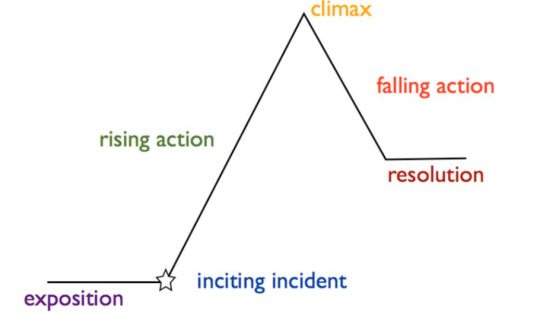
Exposition: Introduces the characters, setting, and basic situation of the story.
Inciting Incident: The event that sets the main conflict of the story in motion, often disrupting the status quo for the protagonist.
Rising Action: Series of events that build tension and escalate the conflict, leading toward the story's climax.
Climax: The highest point of tension or the turning point in the story, where the conflict reaches its peak and the outcome is decided.
Falling Action: Events that occur as a result of the climax, leading towards the resolution and tying up loose ends.
Resolution (or Denouement): The final outcome of the story, where the conflict is resolved, and any remaining questions or conflicts are addressed, providing closure for the audience.
Though the overuse of this story structure may be seen as a downside, it's used so much for a reason. Its intuitive structure provides a reliable framework for writers to build upon, ensuring clear progression and emotional resonance in their stories and drawing everything to a resolution that is satisfactory for the readers.
The Fichtean Curve:
The Fichtean Curve is characterised by a gradual rise in tension and conflict, leading to a climactic peak, followed by a swift resolution. It emphasises the building of suspense and intensity throughout the narrative, following a pattern of escalating crises leading to a climax representing the peak of the protagonist's struggle, then a swift resolution.
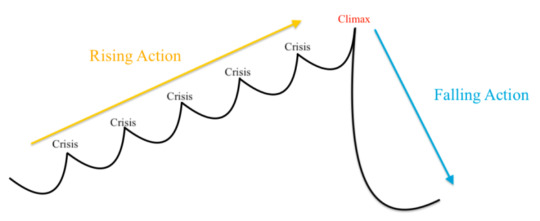
Initial Crisis: The story begins with a significant event or problem that immediately grabs the audience's attention, setting the plot in motion.
Escalating Crises: Additional challenges or complications arise, intensifying the protagonist's struggles and increasing the stakes.
Climax: The tension reaches its peak as the protagonist confronts the central obstacle or makes a crucial decision.
Swift Resolution: Following the climax, conflicts are rapidly resolved, often with a sudden shift or revelation, bringing closure to the narrative. Note that all loose ends may not be tied by the end, and that's completely fine as long as it works in your story—leaving some room for speculation or suspense can be intriguing.
The Hero’s Journey:
The Hero's Journey follows a protagonist through a transformative adventure. It outlines their journey from ordinary life into the unknown, encountering challenges, allies, and adversaries along the way, ultimately leading to personal growth and a return to the familiar world with newfound wisdom or treasures.
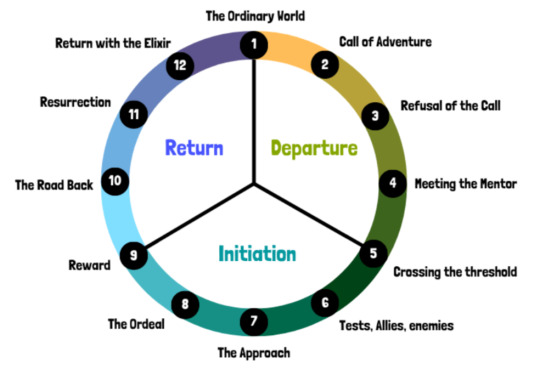
Call to Adventure: The hero receives a summons or challenge that disrupts their ordinary life.
Refusal of the Call: Initially, the hero may resist or hesitate in accepting the adventure.
Meeting the Mentor: The hero encounters a wise mentor who provides guidance and assistance.
Crossing the Threshold: The hero leaves their familiar world and enters the unknown, facing the challenges of the journey.
Trials and Tests: Along the journey, the hero faces various obstacles and adversaries that test their skills and resolve.
Approach to the Inmost Cave: The hero approaches the central conflict or their deepest fears.
The Ordeal: The hero faces their greatest challenge, often confronting the main antagonist or undergoing a significant transformation.
Reward: After overcoming the ordeal, the hero receives a reward, such as treasure, knowledge, or inner growth.
The Road Back: The hero begins the journey back to their ordinary world, encountering final obstacles or confrontations.
Resurrection: The hero faces one final test or ordeal that solidifies their transformation.
Return with the Elixir: The hero returns to the ordinary world, bringing back the lessons learned or treasures gained to benefit themselves or others.
Exploring these different story structures reveals the intricate paths characters traverse in their journeys. Each framework provides a blueprint for crafting engaging narratives that captivate audiences. Understanding these underlying structures can help gain an array of tools to create unforgettable tales that resonate with audiences of all kind.
Happy writing! Hope this was helpful ❤
#story structure#Freytag was an asshole#Freytag was a pre-Nazi fascist#Don't forget Fretyag was super racist#Campbell was racist and sexist. c'mon#Do citations
397 notes
·
View notes
Text
Greek myths: POC in the Legends
It's typical to find some ethnocentric Hellenic pagans insistent on the general lack of colour in their religion. The stories take place across the Greek islands and Italy, so obviously there can only be white heroes and gods in the myths, right? Perhaps it's time for these folks to have a history lesson.

The vague boundaries of Ancient Greece stretched, at the very least, from Macedonia to Rhodes, and housed hundreds of states, towns, cities and villages. Many of these settlements were close to continents such as Africa, where the Egyptians and Carthaginians (a Punic nation) lived. Apart from them, the Greeks and Romans also knew of and traded with the "Ethiopians" (Αἰθίοπες), which was a general term referring to Black people (from Αἴθω + Ὤψ, "Dark Face"). This closeness of different ethnicities meant that there would be some diversity of religious figures by virtue of cultural exchange.
Memnon (Μέμνων) was the demigod son of Tithonus and the goddess Eos, and was the king of Ethiopia. There was also his brother Emathion (Ἠμαθίων) who fought Heracles. Eurybates (Εὐρυβάτης) was Odysseus' "dark-skinned" (μελανόχροος) companion, and was honoured by him above his other comrades (Odyssey 19, Lines 246-249).
And to use a more well-known example: Andromeda (Ἀνδρομέδα), wife of Perseus, was the daughter of Cepheus and Cassiopeia, king and queen of Ethiopia. The legendary woman more beautiful than Aphrodite was Black. She and Perseus may also be one of the earliest examples of an interracial union in the Greek stories.
And to those who would object and say these figures are represented as white in sculptures and wall paintings, the divergence from the original textual sources is a simple result of interpretatio graeca. People will often render foreign persons or deities through the appearance and mannerisms of their own nation (e.g. old paintings of Jesus in Ethiopia and China showing him to be Ethiopian or Chinese), and in this case Black characters were filtered through a Greek and Roman lens.
The ancient Greeks and Romans saw skin colour as a designation of one's national origin, but not as a racial identifier. If you approached a Roman and told him the vikings were of the same "race" as him, he would be deeply offended. "Race" was formulated by European pseudoscientists in the 15th to 16th centuries to justify the barbaric things that were done to enslaved Africans, Indigenous peoples in the Americas, and later South Asians.
I as a white person am wholly comfortable, and also appreciative, of the presence of people of colour in my religion. They serve as a reminder of the universality of attributes such as heroism, strength, kindness, courage and valour. Virtue is not bound to one skin colour, and we are all fundamentally one race: the Human Race.
So don't let these pseudadelphoi (false siblings) stir discord and disunity in our communities. All are welcome in the Faith and to the graces of the gods, regardless of colour, sexuality, or gender identity.
8 notes
·
View notes
Note
Austria is discount Germany, Azerbaijan is discount Turkey. "One nation, Two states." Both have a strongly mythologized history & nationalistic identity where their intellectuals and political leaders are (or were) placed on a pedestal. Both are (or were) committing war crimes/genocides (Herero, Namaqua, Jewish, & Roma people) & (Armenians, Assyrians, Pontics/Greeks). both have ripples that carry over today (Fascism, massacres, ethnocentrism, denialism). Azerbaijan is wilding Nagomo-Karbakh RN.
hey theres a lot to criticise germans over BUT theyre like among the best when it comes to acknowledging their horrific history and crimes at least during nazi germany 😩 not at all comparable to turkey for example, which afaik completely denies the genocide even happening
6 notes
·
View notes
Text
Perfect, no notes!

OP hit a grand slam with this one. I just want to point out some observations on why people seem to have a hard time understanding the themes of Greek mythology that I have personally encountered:
1) Greek words: As OP mentioned, a lot of times ancient mythology was an allegory and some names of the Greek gods are the literal personification of those concepts. Zeus isn't always kind because lightning isn't always kind. He can seem ruthless because lightning can be ruthless. In the Prometheus myth he is the one who decides if humans have fire or not because lightning causes fires and Zeus was probably believed to have given the first humans fire.
2) Local myths that have been re-organized: Sometimes the confusion stems from the fact that different city states and towns in the ancient world had their own local government running it and so myths varied from polis to polis like the death of Adonis being caused by Ares, Artemis or Apollo depending on the location or Hercules being an Olympian depending on the location. A lot of these locations also had tourism and depended on tourism as a valid source of income so they depended on their myth being different enough and hero focused to bring in tourists or people on a religious pilgrimage. Unfortunately as the Hellenistic and Roman periods had empires that blended all those cultures together but selected the favorite version among all of them (often Athenians but not always) I find that modern people have a hard time wrapping their heads around the concept that myths are wobbly, but I agree with OP that Zeus represents order in most ancient cultures that worshipped the Greek gods.
3) Evolution of the Gods: I also find that people have a hard time with the myths because they are older than writing, were originally oral (anyone who has ever played the game Telephone will get that variety will happen over time) and may have started in the Mycenaean period or even older but changed over time. For example in the Iliad Zeus mentions his war with Poseidon and that's because in the Mycenaean religion Poseidon was the original king of the gods, not Zeus. Artemis and Apollo were not twins and Artemis and Dionysus were originally the children of Demeter, this is why they both have ties to the wilderness and mother nature because they were originally rustic gods like Pan. So I find people often mix the gods and myths because they have changed over time.
4) Ancient culture vs Modern progress: The biggest misunderstanding is the ethnocentric way modern people view the ancient world. In anthropology ethnocentricity is the act of judging a culture based on your own culture's standards which ruins the understanding. Anthropologists try to judge the cultures based on the culture's own rules and standards to better understand why they do what they do. In the ancient world women were seen as property and didn't have the same rights modern women have. Kings were also oftentimes seen as directly connected to the gods and thus given "Divine birth" to rule. People see Zeus cheating and judge it based on today's standards whereas the ancient world saw it as a connection to Zeus and Zeus granting this king the right to lead because either he's a direct descendant or an ancestor was and praised their mother's beauty in the process because beauty was very important to the ancient Greeks and if a person was so beautiful to drive a god to procreate with them, then it was seen as high praise. So if they're being praised, why is it described as "rape?" That's because of the purity culture of the ancient world which discouraged women from seeming willing in order to give them a modest appearance. We don't know the true feelings of the women because they were not the main topic of the myth, their children were. Also, even if they seemed like they were consenting like the myth of Semele who is excited about being with Zeus but gets tricked by Hera, they couldn't be seen as actually consenting because they were viewed as property and thus the consent needed to come from their husband or father and most of the time the gods bypassed that consent. Any sexual act towards a woman by a god was seen as a violation of her father or husband but never her because she never had a say in her own life. They were captured by the god and the old word for captured would often be translated as raped. In the modern world this is thankfully different with sexual liberation helping women untangle from purity culture but the ancient world had its own rules and in order to better understand the myths, one must understand the ancient culture, rules and laws or else big misunderstandings will happen. For example, often times when humans in ancient history were seen as very exceptional, beautiful or brilliant to the point of seeming inhuman it was believed they were the secret love child of a god. This can be observed with Alexander the Great who was often seen as being the son of Zeus. Sidenote: Consent of a woman also didn't matter to the ancient Greeks because marriage was seen as a political union. This is also why Aphrodite is seen more as a type of madness that opposes Zeus/order instead of love in the way we understand it today. Love was not the priority in marriages and Aphrodite was seen more as a goddess of lust and then later Greeks and Romans started to explore her more and look at love differently but in the ancient oral myth world she was definitely seen as a menace that ruined arranged marriages and thus got in the way of order.
5) Allegories vs local legends and tragedy: As OP stated, the gods were a way for the ancient Greeks to understand the world around them. These myths were Mnemonics (named after Mnemosyne: goddess of memory) to tell the story of how something came to be or to remember when to water the crops or remember when the seasons change, etc. There is a myth of Orion lusting after and chasing the Pleiades because he's literally following them in the sky. The ancient Greeks were also comforted with the thought that if a person died young it probably meant they were loved by a god and taken. Local legends like the Spartan Prince Hyacinth who was said to have been tragically loved by Apollo, were said to have been chosen by the gods and so we have the "brides of Hades." These were young girls of marriageable age dying and being buried in their wedding dress and said to be marrying Hades. So there is a lot happening allegorically but when modern people encounter an ancient myth without the historical context they judge them in the same way they would judge full humans and forget the allegory.
6) Missing myths and cultural references: There are so many vases that reference mythos that were either never written or have yet to be found but well known or specific to their region. There are also a lot of ancient tragedies and comedies we have references to that have yet to be found or are incomplete or were purposefully disposed of like some of Sappho's work. Even if you know the information, you can't judge a culture based on small samples and echoes of preserved fragments. We are missing so many cultural, religious and historical references that it's hard to make a confident assessment on so much that is missing, but we try and might still get it wrong so some people who have done research might be using older resources that are now invalid due to new discoveries or old biases from researchers that are now contested, this is especially prevalent with 19th and 20th century research of the ancient world. So it's important to keep in mind that we might be getting information about the gods that might be outdated or littered in 19th/20th century biases which tended to see the gods in a more negative and human light.
Conclusion: The ancient myths are fascinating and fun but it's important to remember they are older than the Bible with concepts we have lost the meaning of due to various reasons but even in their own context the stories follow the pattern OP listed. I graduated studying this and will be going to a Master's program to study the archaeology of it, and I can tell you they are way more fascinating in their original culture and context than ethnocentric modern interpretation.

Another reminder that Greek mythology is always somehow symbolic, metaphorical, allegorical, since we are dealing with anthropomorphic personifications and other embodiments of cosmic powers.
For example: Demeter has sex with both Zeus and Poseidon. Something-something about the relationship of the Earth with the Sky and the Sea (or the celestial and chthonian powers). ESPECIALLY since these relationships are said to happen at the beginning of the world, in the primordial times during which the world settled itself for what it is now.
Herakles' wedding with Hebe, the personification of youth, checks in with when he becomes an immortal god (aka, an eternally young entity). What better way to symbolize a hero escaping the clutches of death than by him becoming the husband of the spirit of eternal youth?
Why is Hestia never leaving Olympus? Something-something about her being the literal personification of the hearth, which is at the center of the house/community and does not move.
Why is Ares getting his ass kicked by Athena? Because Athena is civilization, and Ares savagery, and in the Ancient Greek mindset intelligence, wisdom and craft will always be above brutality, bloodlust and random cruelty.
Do I need to spell it out that the myth of Persephone-Hades-Demeter is about the cycle of the seasons, and how the earth renews itself and brings back life after a time of death?
And I wonder why Ares' companions during his mass-slaughters are called Phobos, Deimos and Eris - Fear, Panic and Discord... Why would the goddess that breaks harmony and sows feuds and chaos be depicted as the close sister of the god of the ravages of war and of the brutality of conflicts, what a strange mystery!
And I can go on, and on, and on. Remember, the Greek gods aren't just super-heroes or wizards (that's more in line with more "humanized" mythologies, like the Irish or Nordic ones). They are embodiments of concepts and ideas, personifications of natural forces and cosmic powers, they are living allegories and fleshed metaphors. Zeus wields the lightning because he IS the lightning and thunder. Dionysos is both the bringer of joy and madness because he IS alcohol. Hades is both the name of the god of the dead, and of the realm of the dead. Hestia's name is literaly "hearth" in Greek, Hebe "youth", Nyx "night", Gaia "earth", Eros "desire". You can write "Eris met Helios at Okeanos' palace" or you can write "Strife encountered the Sun at the palace of Ocean" and that is the EXACT SAME THING!
[Mind you to limit the gods to being JUST allegories is also a mistake not to make. Greek deities are much more than just X concept or X idea... But one part of the myths will always be, down the line, some weather metaphor or some natural cycle motif]
#greek gods#hellenic polytheism#greek mythology#greek myths#ancient history#archaeology#scholars#drama in the research department
1K notes
·
View notes
Text
The Real History of the European 5-Act
In researching the European story structures to try to figure out the history of the 5-act play, I encountered a ton of massive retconning and false attributions that my literature professors have repeated, but it was wrong. So in order to set the record straight, I propose going after the actual history of this particular Story structure, the retcons that made it possible, and the lies that are instituted today. Note: This file is probably going to be corrected a few times as I find more information. What is presented is what I know as I know it. I will do my best to keep it up to date.
Madame Hardy helped with portions of this essay.
The Myth So usually, it goes something like this, your Literature professor/teachers stands up in front of the class and then argues that the root of all great European Literature is the Greeks! And particularly Aristotle, who argued for the Three act model: Beginning Middle and End. And this was until Shakespeare came along--another great White man and reshaped the history of plays by making it Five Act. He was forced to do this because of candles. Candles in the Black Friar, and this is now the correct and forever structure of all plays, movies, and hopefully books. At the center of this is conflict. And then linear time.
This however, is a big fat lie that seems to be repeated through massive retcons on actual history and how it actually worked out. It’s mostly critics retconning history without people checking if that is true. So to recover that history, let’s review what Aristotle really argued for.
Aristotle
Besides Aristotle, 384–322 BCE, being a misogynistic, classist, ethnocentric pig, here are the key points Aristotle really argued for: - The Two Act play. (I know) - The Twelve Act play (Yes, I know) - Women and slaves cannot write for crap. (Yes, I know this is terrible). - Simple and long plots are better, but not episodic.
You’re sitting there and going, BUT THE THREE ACT PLAY! He argued for three acts!
He didn’t. He said plays have a Beginning Middle and End, but said the act structure should be two acts, not three. He only laid out the Beginning Middle and End to define them, like a school grader. A beginning (As roughly said with less poetic language) is stuff with things after it. (Which to be clear is more eloquent than he was). A middle is stuff before and after it. And and end is stuff before it. This is what he said in Poetica. BUT when it came to act structure, he argued the best play is long, and only two acts. Happy with something bad is discovered, and then it all goes bad.
The superior play, to him had the best chorus ever. No good tragedy or Comedy was without a chorus! This is clearly the best part to him. Also, character is of very little importance. And the core of the story should be morality through negative reinforcement, not conflict.
- Complication
- Denouement
(Note that the definition of beginning middle and end is actually still 2 acts, not 3 according to him.) http://www.authorama.com/the-poetics-19.html
The order of importance according to Aristotle is:
Melody
Events
Diction
Character
Spectacle
Note, again, this would give most Literary Agents serious pause if you said that. (If you want a reason, look at Gertrude Stein’s Modernist writers as the primary motivator, though there are earlier writers that brought characters to the fore over events, such as Jane Austen, it solidified later in history, but this is not a lecture on European and European Diaspora individualism in Literature. Research that yourself.)
Despite that, I still have this picture of someone setting their manuscript to music and then demanding that the agent read a list of events without much characters and the agent screaming WTF and posting it on some social media website. But wait til you get to the part where women can’t be “manly”...
Errata he argued for:
Note: When he says plot, he means events, since he separates plot and characters as different things, but doesn’t talk about events as separate from the plot. Plot to him, is more like the event chain, absent of character. Character is more an avatar for the audience.
- “If they had to perform a hundred tragedies, they would be timed by water-clocks, as they are said to have been at one period.” http://www.authorama.com/the-poetics-8.html
- Can be performed from memory. http://www.authorama.com/the-poetics-8.html
- “The limit, however, set by the actual nature of the thing is this: the longer the story, consistently with its being comprehensible as a whole, the finer it is by reason of its magnitude.” http://www.authorama.com/the-poetics-8.html
- “The Unity of a Plot does not consist, as some suppose, in its having one man as its subject.” http://www.authorama.com/the-poetics-9.html
- “Tragedy, however, is an imitation not only of a complete action, but also of incidents arousing pity and fear. Such incidents have the very greatest effect on the mind when they occur unexpectedly and at the same time in consequence of one another; there is more of the marvellous in them then than if they happened of themselves or by mere chance.” --http://www.authorama.com/the-poetics-10.html
- “Of simple Plots and actions the episodic are the worst.” -- http://www.authorama.com/the-poetics-11.html
- “A Discovery is, as the very word implies, a change from ignorance to knowledge, and thus to either love or hate, in the personages marked for good or evil fortune.”-- http://www.authorama.com/the-poetics-12.html
- “...Peripety, will arouse either pity or fear“--http://www.authorama.com/the-poetics-12.html
- “A third part is Suffering; which we may define as an action of a destructive or painful nature, such as murders on the stage, tortures, woundings, and the like.” -- http://www.authorama.com/the-poetics-12.html
- This is how the stage was to be divided: “Prologue, Episode, Exode, and a choral portion, distinguished into Parode and Stasimon...“ --http://www.authorama.com/the-poetics-13.html
- He argues for the tragic flaw here: (loosely, error in judgement): http://www.authorama.com/the-poetics-14.html
- “The tragic fear and pity may be aroused by the Spectacle; but they may also be aroused by the very structure and incidents of the play—which is the better way and shows the better poet“ -- http://www.authorama.com/the-poetics-15.html (Note that modern writers mostly would say either combination of events+character or character, not plot alone.)
- Argues for emotional artist here who is “mad”: “Given the same natural qualifications, he who feels the emotions to be described will be the most convincing; distress and anger, for instance, are portrayed most truthfully by one who is feeling them at the moment. Hence it is that poetry demands a man with special gift for it, or else one with a touch of madness in him; the, former can easily assume the required mood, and the latter may be actually beside himself with emotion.”
So if it wasn’t Aristotle that laid out the Three Act Structure... Who was it?
Aelius Donatus
Aelius Donatus, mid-Fourth Century, was the one that argued for the Three Act Structure, with the Beginning Middle and End, in a critique of one person, Terence, who wrote Six plays. And only in the prologue: Commentvm Terenti, Publii Terentii Comoediae Sex. The leads to the next difficult part. The source material Commentvm Terenti, Publii Terentii Comoediae Sex has never been published with English because the original Latin text is damaged and they can’t publish it in English. Its partially translated in German. So this strikes it as a good source material to push Literature students. It’s difficult to find out if Donatus actually did argue for three acts and what those acts should contain because no one has bothered to translate the text in all this time, but he is the one that laid out protasis, epitasis, and catastrophe as the basis. (Though without the original text this is hard to discern).
It’s not likely given later texts that he argued for conflict as the center of the story. But he was after the invention of the 5-act story.
Horace
Horace, Poet 65 BCE - 27 BCE, was the one that said 5 acts is the correct number, but also argued, as Aristotle did, for a chorus, and also that the center of the play should evoke Morality and should make people feel something.
He didn’t actually bother defining what’s in those 5 acts or what they require, which is a step back from Aristotle. To him, a good play should be “No play should be longer or shorter than five acts”
But also commented: - Deus Ex Machina--he was a fan. “And no god should intervene unless there’s a problem. That needs that solution, nor should a fourth person speak.” - Loved a good Chorus--clearly the best part.
“The Chorus should play an actor’s part, energetically,
And not sing between the acts unless it advances,
And is also closely related to the plot.”
- Teach morality:
“It should favour the good, and give friendly advice,
Guide those who are angered, encourage those fearful
Of sinning: praise the humble table’s food, sound laws
And justice, and peace with her wide-open gates:
It should hide secrets, and pray and entreat the gods
That the proud lose their luck, and the wretched regain it.”
But it’s notable he was not in favor, as Aristotle was to make it negative reinforcement specifically.
- The part that people skip the most about him, is that he argued that loosely, poets should write about what they know and that what they write about should make people feel something.
- He does not delineate time as a primary principle of how to structure a play, compared to Aristotle. Also doesn’t bitch and moan quite like Aristotle does. Since his core argument is about emotionality, then morality, with a good Chorus, he does not care to lay out proper structure beyond that. What he and Aristotle would agree upon is The Chorus is the best part of the play. All else is second.
Five acts, but no definition for the acts and morality as the x axis and emotionality as the y axis? And there you go. That’s Horace for you.
But--but Shakespeare...
Was retconned. Shakespeare never wrote his plays in 5 Acts. He didn’t label them as such. That happened much later in time. https://thealexandrian.net/wordpress/36059/theater/shakespeare-sunday-hamlet-of-acts-and-scenes
It was after his death that the Five Act play became popular, not during it, so saying he intended the plays to be five acts when the five act play as we think of it was invented after him, is wrong. It’s like saying a 16th century writer must have intended their work to be clearly Modernist to Gertrude Stein’s standards of a good story and those sensibilities. But that is not true. Some historicism needs to be applied before readercism.
Four Acts! in Europe only after Shakespeare: http://www.philological.bham.ac.uk/fortuna/intro.html
It’s better to read the paper than me to go on about my interpretation of the paper.
Notable is the Shift in Character-centric over Plot Centric around 1811-1820′s. Might be because of mass industrialization taking effect. Noted by Worsley in A Very British Romance documentary.
Five Act Again?
https://www.videomaker.com/article/f04/17174-dramatic-structure-story-arc-freytags-pyramid
The parts screen capped are found here: https://archive.org/details/freytagstechniqu00freyuoft (Note that it does not work with online readers--I could not find a better version.)
Freytag (1816 – 1895), created a Pyramid in Die Technik des Dramas and then retconned history to argue his was right. Exposition, rising action, climax, falling action and dénouement

p234




304-305
Something he got right:
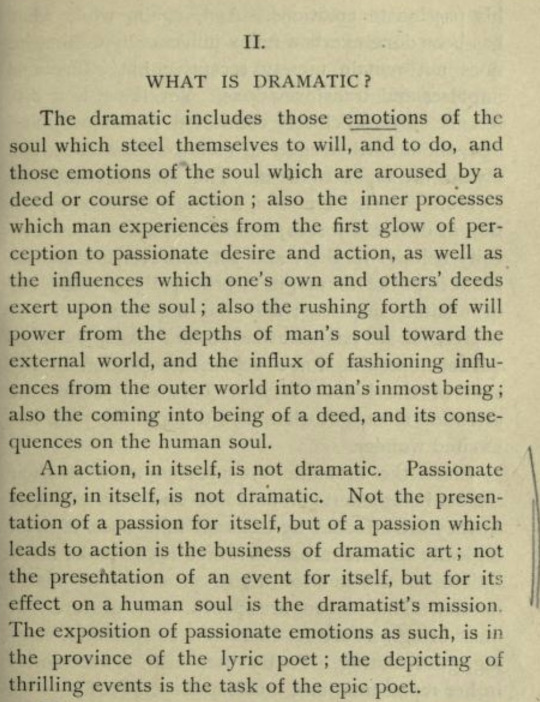
p 19

On Page 20 he outlines what is thought of the three modes of conflict, but he’s arguing instead for three modes of EMOTION, not conflict. This goes to show the concept of what it means is different over time. The whole It’s either internal conflict, external conflict, or man v. nature isn’t what he argues at all. He argues for emotion turned outward, inward, etc and using those as contrasting points to bring excitement.

p 24
His concept of Greece is a bit off. Also shows a bit of inflated ego. The idea that culture is a great progression to a pinnacle of evolution is something certainly believed in his time, but it is hardly true and needs much updating. Maybe if he believed as most anthropologists now do, he wouldn’t want to do genocide on Polish people... and hope the Germans take them over because he thinks Germany is superior to everywhere else. To be fair, you can smell World War I and World War II in his attitudes. (And yes, I know, the whole not all, thing, but most definitely him.)

29 He argues against conflicts continuing throughout the piece here. The lack of denouement would not be OK with him. Unlike Aristotle, he argues for a consistent progression of events so that the ending feels inevitable.

p 41
So many wrong assumptions with no support for his conjectures... there are no writings from Shakespeare on how to write.
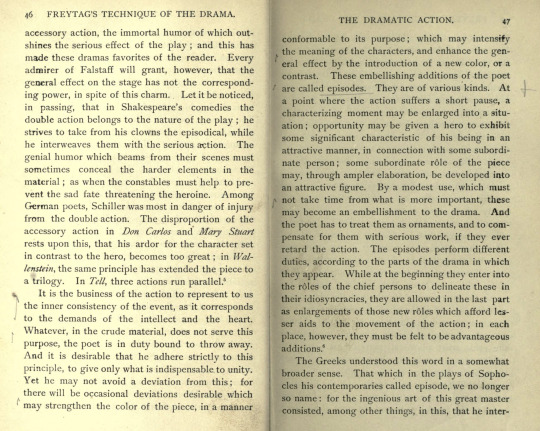
46-47
If you remember, Aristotle was dead against episodic. Freytag is 100% for it and defines it for you.
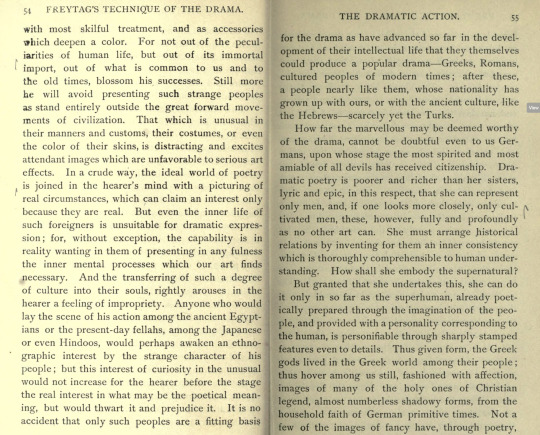
Just in case you doubt his a-holeness... here is p54-55. It’s a high brow way to say Jews (and worse the Turks) Japanese and Hindus are inferior to his Greeks and Germans. If you don’t feel stabby yet, remember, he doesn’t like women that much either as writers.
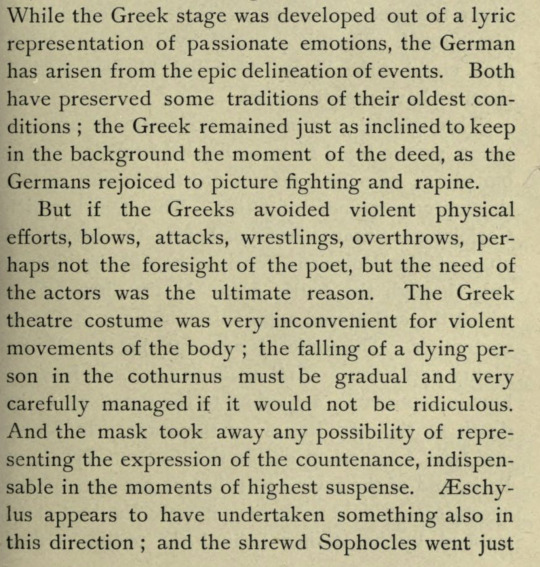
p. 75
This is so wrong that I think my Aunt (a classical professor) and one of my lit teachers would have a field day with this. I don’t even know where to start with this. As I said he cites nothing and you have to take him and his ego that he’s correct. He cites things, mostly plays as ways to back himself, but doesn’t really prove it as fact, but more something to retcon it was true.

p 80-81 argues for tension through emotion, heightened, but not conflict, but contrast-- saying it is a German ideal.

p. 90 Here, you will see the argument for the individualism of character. There are some arguments from social sciences and humanities that the movement towards individualism comes from industrialization and the need for neolocal living patterns within that. But it is worth noting, too, that Freytag was a huge imperialist, and so it might also come out of his ideas of imperialism and superiority.


p 94-95 This sounds like the groundwork for what later will be called the “Inciting incident”

p. 96 Freytag was also known to be highly religious. It’s not hard to imagine that this might have had ain influence on how he thought of this story structure.

p. 98 He imagines how the Greeks were... but it’s fanciful at best and has no support in reality.

115 (diagram)
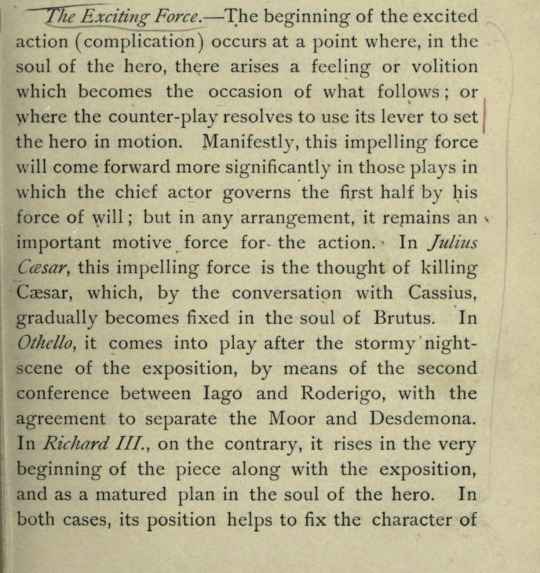
121 He explains what the exciting force is here.
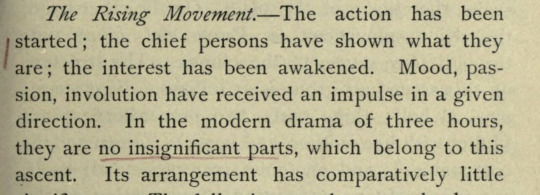
Rising Movement: p. 125

Definition of the Climax: 128
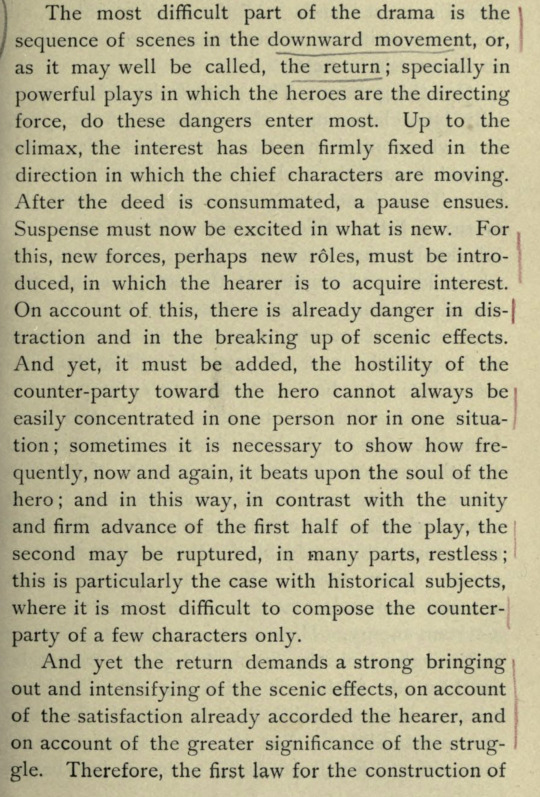
p. 133 “Downward movement” definition and reason for existence.

p 137--Definition of Catastrophe.
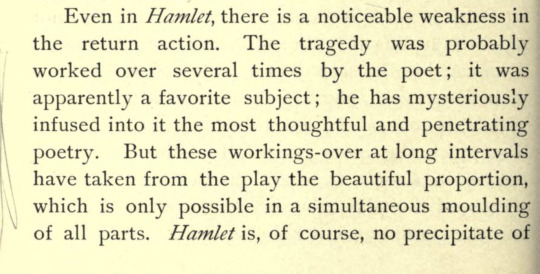
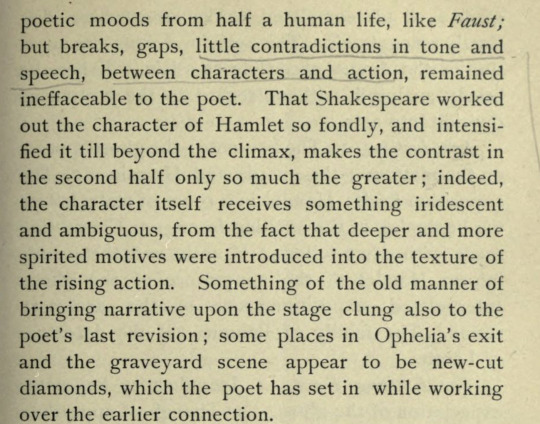
p. 188-189 His ego doesn’t end, because he asserts his invented structure is correct and therefore Shakespeare born before him did it wrong and used his structure wrong. How can you use a structure wrong when you don’t know it even exists and is invented some 300 years after you?
To me it sounds something like, “Look at that Neanderthal use that hand axe. Pshaw, why can’t they use a stainless steel axe with an industrial made handle ordered online?”
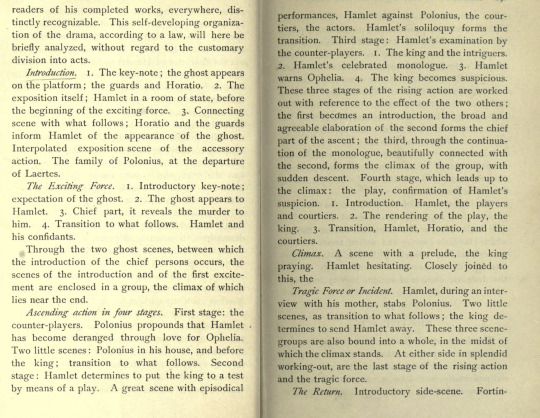
190-191 (Exciting force and Tragic Force)
It is worth mentioning around this time, to put Freytag into historical context, there was John Ruskin and other Preraphaelite types. So the general thought was things like celebration of nature and returning to the old forms in reaction to some of the impressionists. It shouldn’t be a shock, then, that Freytag follows suit and extols the virtues of Shakespeare and Greek Philosophers, particularly the likes of Aristotle, even if done wrongly. The idea of returning to “classics” was popular.
19th and Early 20th Century
Selden Whitcomb
In 1905, Selden Whitcomb made “The Study of the Novel.” Selden Whitcomb was a university Professor at Grinnell, Iowa. He served there from 1895-1905. There is no other paratext about him I could find. Note: Unlike many of the men on this list he didn’t get any credit for what he did and also is not interested in self-aggrandizing so his work comes off more academic, and as he intended, a tool for teaching the variety of what a novel could be. He also mentions and appreciates women writers. There’s also indications he read Aristotle and Shakespeare in full and faces that head on in the text, and comparing their writing to his contemporary takes of novels from his time period and analyzing that, rather than pure worship of Shakespeare and Aristotle (like Freytag, Rowe, Egri, somewhat and Field). His examples are also very varied covering a range of works from the European sphere. I give him a break since mass translation wasn’t big in 1905, however, he doesn’t put down People of Color at all in his citations.

He’s arguing for the variety in novel structures. He does this in the majority of the book. Page 3.
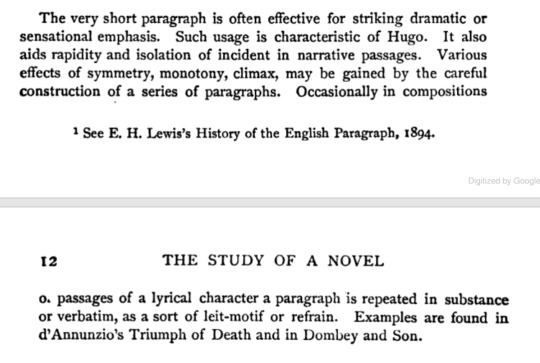
Showing that they understood psychological effects of manipulating sentences, words, but the push for chapters to do the same came later in history with people like Gertrude Stein.
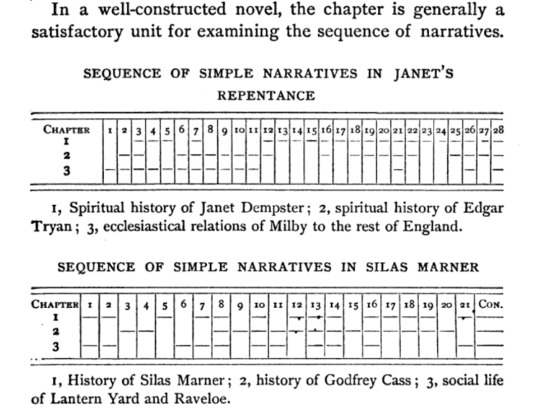
He likes to draw diagrams for the majority of the novels to describe various parts of the structure.

This was apparently before the invention of the novelette, novella, etc terminology.

He often uses Silas Marner for analysis, but more as a crutch to look on, though it’s clear from his reading list, he read the gamut of books.

p. 56 -57 This shows he actually read Aristotle in full. A Miracle considering the other people on this list. (Though it’s clear that Lajos Egri read all the books he says he did)

See, he doesn’t think of the chapter as a psychological unit. It’s before Freud.

Here, he’s referring to Romance, as in the “Romancism movement” of the 19th century, rather than the genre, Romance. There were different forms for novels at the time, including Morality tales, Realism, Romanticism, etc.

This is his diagram of a Epislatory novel Redgauntlet by Sir Walter Scott. This might look familiar later in history with a similar diagramming of story from the 1980′s.
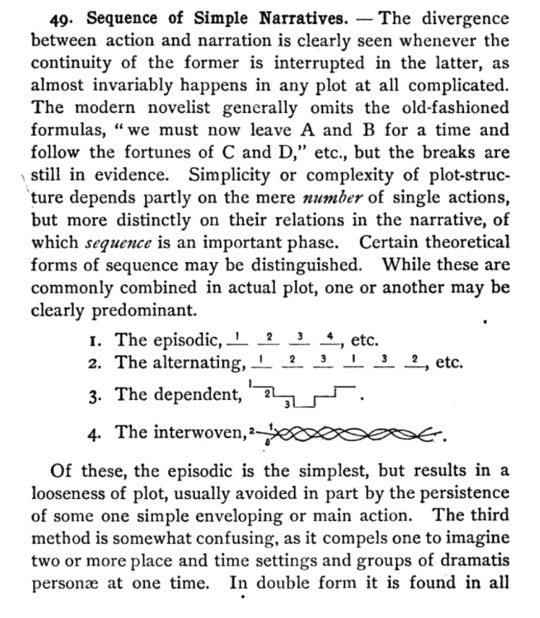
He describes the braided essay/plait here. This has fallen out of favor, though it was used in Encanto since it’s often used with Indigenous voices.
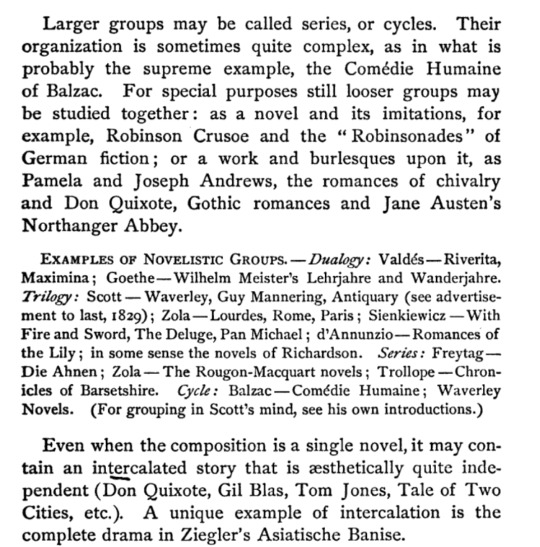
More examples of him showing the way to group things. Comparative Lit Profs would be pleased.

A much better definition of Beginning Middle and End than Aristotle.

Oh look, he read Aristotle in full. The continuity and single action is described much like this in Aristotle, but he gives wiggle room and updates Aristotle’s ideas to allow for flashback, etc.
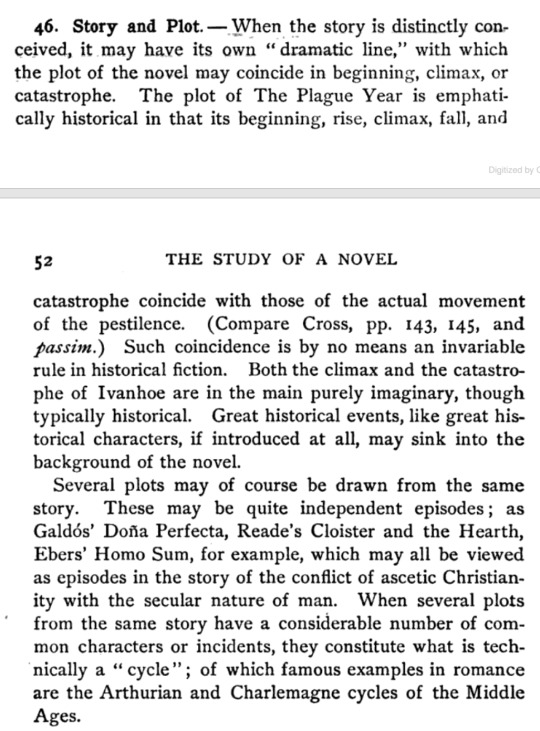
Argues really hard for “Dramatic line” making me think he thought he was the first to think of it this way.

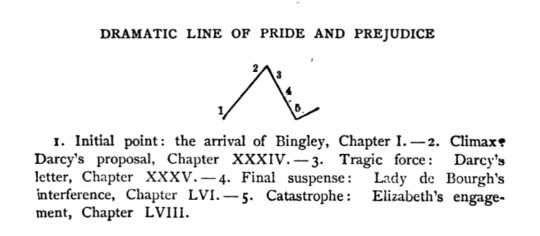
If it looks familiar, it’s because Kenneth Rowe stole from him later without credit. He also drew one for Jane Austen. Kenneth Rowe stole both.

“Line of Emotion” which was later described by Kurt Vonnegut for his proposed thesis that was rejected.
Early Narrative Film
The first narrative director was Alice Guy-Blaché who was of Chilean descent, but grew up in France. She rose from the status of being a secretary to the first female director ever. She cast interracially and was the first to make a film with a 100% black cast. It’s not racist. The whole film is a lot of fun and asks about socio-economic background rather skillfully. https://www.youtube.com/watch?v=ZBk_rSgAMJw
It was restored recently, but if you watch the whole film, the film really isn’t about conflict, but a portrait of one man and his decisions about money and what he learns about rich people. It has a circular ending. https://www.themantle.com/arts-and-culture/women-directors-silent-cinema In fact, much of the silent film era was helmed by women, not men. The earliest film was mostly documentaries, but later films also experimented heavily with what could be done with the medium, until talkies came along. Once men found that film could make a lot of money, they took over the industry, pushing out a lot of the female directors. This is about when the shift in narrative changes.
After World War I
Most literary scholars will mark this as the Modernist period. One of the most influential periods for contemporary writing. At the center was Gertrude Stein for much of literature, but there were other movements parallel to hers going on. While Gertrude Stein was more interested in the limits of what language itself could do, what repetition really meant and the sound and movement of words themselves, many of her contemporaries were experimenting with form, structure, etc of format. Gertrude Stein had in her circle both visual artists and writers. This included, but was not limited to Picasso, Steinbeck, Faulkner, etc. More people remember them, than her. Gertrude Stein was also a lesbian and open about it, which is worth noting, since she isn’t that well remembered and it ties into the last section of this run down of history.
To be honest, I hate the guts of Steinbeck. He can go stab himself in the eye.
I respect Faulkner, though he’s not my favorite. He wanted to push the limits of narration and form.
People felt disillusioned after they felt the world broke. There was a pandemic, two World Wars, so much of the things they did during the modernist movement was to try to break form and tradition. There was a huge amount of experimentation on what the old forms could and couldn’t do and to press those limits. Separate movements also sprung up at the time.
This is when the birth of the chapter as a psychological control came about, and the use of first person and more narrative choices became available. The shift from omniscient to other points of view started to come into play.
Among the thinkers of that era was Bertolt Brecht (1898-1956). This name was given to me by Jim Fitton to check out since it seems he was opposite of what we have now and opposed to Freytag.
https://en.wikipedia.org/wiki/Bertolt_Brecht
He would have come to age during the First World War in 1914 and also witnessed World War II.
He created what is known as “Epic Theater.”
https://www.yumpu.com/en/document/read/12210346/13-the-modern-theatre-is-the-epic-theatre-yoonsookslesection

p. 37 I don’t think it should come as a surprise that his, like many of the authors of his generation is more focused on reflection and morality. Pandemics and two World Wars will do that to you. His ultimately was flattened from memory, even thought he’s shortly after Freytag, but I thought it was worth noting because everyone argues that it was a straight line. But this is not the case. How story and story structure has been thought of has changed. The difference is that the landscape has often been flattened to argue for superiority, rather than open it for debate. If he, in his position, could be flattened, then who else was flattened and forgotten in our rush to say that the European 5-act and European 3-act are the only ways? Where are our marginalized authors, then?
Three Act Again?
The Art of Dramatic Writing by Lajos Egri (1888 - 1967) might not be the first to have introduced conflict as a center point of the plot, but it evidenced that by 1946, when this book was published, that this became the center point of story structure as outlined in his preface. Note that he’s not as much of an a-hole as some of the other writers and critics on this list and at least has a hint of humbleness about him, though a limited knowledge of story as he cites mostly white men and no translated works.
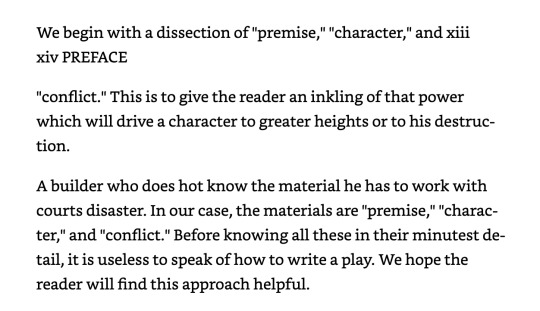
The very shape of the beginnings of the contemporary ideals of what story should do and say are in these words. Everything must start with a “premise” and a character. And the premise must have a conflict. Spelled out for you, right there. The word conflict, not contrast. The surmised shift is somewhere around the 1910′s-1920′s. Maybe with Birth of a Nation. (The racist film it is).
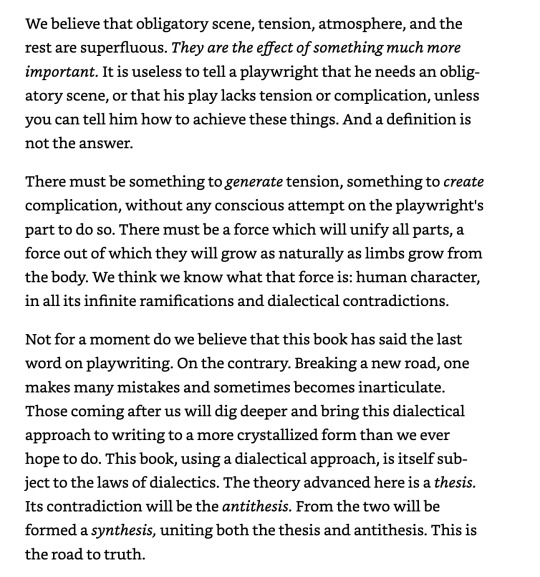
He argues for the y-axis to be tension, but not how the acts are to be laid out.

Despite this, like previous writers, like Freytag, he argues strongly for emotion as a requirement of the script/play. This may have been stripped from later explanations of the requirements, since I’ve seen emotionless plays based on such prescriptions before where conflict become more event-based (Like Wonder Woman 1984) and less about the emotions it evokes.
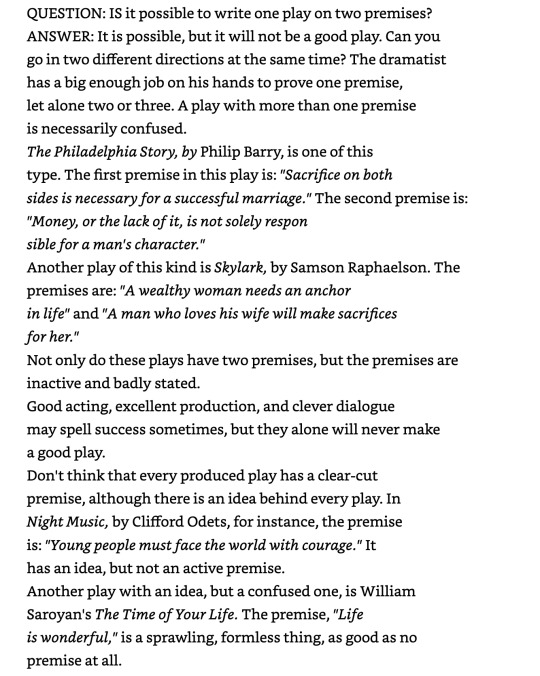
You can see his shortcomings in this “answer” in his book. All of the citations are white males. Also, it ignores other story structures like 1001 Arabian Nights, which was translated in 1811, which are multiple premises. Despite this he does have a good point here:

But you can see a sharp shift in how story is thought of from Freytag to Alice Guy Blaché to here. There is much, much more emphasis on premise, individualism and conflict. The addition of conflict as a way to get emotions out becomes center stage, but also notice that the primary citations from him, mostly include white male writers. The times he was writing in, also might have played a bias, since it’s after World War I and World War II, but subsequent generations didn’t question this absolute need for conflict in the story might have been a result of the conflict during the rise of Hollywood itself. Even Freytag was far more about ensemble casts and highlighted generally large overarching stories and more on the spectacle.
Here, there is more emphasis on character and (His) individualism being illustrated. This led to Syd Field reading his book, picking up points from it and then coming up with a drawn out dramatic structure.
Syd Field.
Dramatic Question, condenses and invents “Inciting incident”, conflict-centric, as taken from Lajos Egri. Cited as 3 acts, but kinda 4 acts, trying to expand on Lajos Egri and other former writers.
Five Act Again, Again. (rebooted with conflict and blended with Syd Field)
I can’t trace the book (There are too many how-to-write book by the time period mentioned) but I’ve read and watched enough movies to know that the five act was reintroduced, most likely in the laste 70′s early 80′s and said it was Shakespeare. In my own lifetime I’ve seen the structure of the 5-act change. There has been some realization thrown in around the early 2000′s. The amount of denouement has also dropped dramatically, such that the fall action is much longer than before. People keep saying that it has always been the same as Casablanca, but then I often pause movies, etc to figure out the timings of the structure and keep track of the time stamps and I can say it’s shorter and shorter on the denouement. Sometimes the denouement is followed by another conflict. The timing from an older movie like Casablanca, if you don’t retcon it to today’s standards and follow what Syd Field said, and the timing of today’s TV episodes and how the conflict is laid out has changed drastically.
This is where I’m not quite sure why it changed so much from the late 70′s to late 80′s and who retconned Shakespeare again. I only can prove that it changed by asking people to compare the time stamps on Casablanca to say something like A more recent marvel movie.
The women and marginalized writing about writing.
The majority of women contemporary to the men, of which are written here and have surviving writings are not as prescriptive as the men, even up to contemporary times.
These would include writers like Virginia Woolf, Adrienne Rich, Audre Lorde, L.M. Montgomery, Anne Lamott, Gertrude Stein, Anne McCaffrey, Marion Zimmer Bradley (though her reputation was ruined in post, it’s still worth noting she did write about writing in the back of her books). Most of the time writing and how to write for marginalized groups is couched in a lifetime of proof and more reflective, than prescriptive. It might be the nature of privilege itself that makes a white cishet man more emboldened to plant a flag and say their way is the correct way and discount their privilege might have had a factor in their grand success.
No, the majority of the writing about writing for women is couched in this or that life experience that made them realize and reflect maybe they should do that for their own writing. It’s loaded in anecdotes of things that they experienced for themselves and how they teased it out for a specific book. Almost as if if they said it out loud, they fear they won’t be believed.
This means that the history of women’s writing is being subverted by white cishet men’s prescriptions of the “correct way”, but in examining that writing, maybe there is another story structure waiting to be tapped out of it. One that was implicitly suppressed by men closing the doors on women’s success over generations.
In my own experience, I’ve seen more women suggest Stephen King’s “On Writing” than men suggest Anne Lamott’s “Bird by Bird.” Some of the women writers are hard pressed to remember she even exists at all. But isn’t that a kind of cultural destruction to say that a cishet man can write better about writing than a woman can? What happened to What about Virginia Woolf? No one read the backs of Anne McCaffrey’s books. No one tried to read about women talking about the struggle of writing? The same contemporaries as the men listed are often said to be invalid for advice and they aren’t even thought of when one asks, “So who do you read for writing advice?” Audre Lorde wrote a ton about how to write. So did Adrienne Rich. Lorde is a lesbian black woman, but I’ve never seen a single person point to her for writing advice, though she gives that and life advice out by the bucketfuls. Rich is a lesbian and writes about writing in a whole entire book. I’ve never heard her recommended. And I think, women and marginalized groups should really think about what that all means that we, the marginalized, have deferred over time to white cis het men to tell us that the way that we write stories and structure them is somehow “wrong” or at least “inferior”. Is there something truly bad about being more reflective in one’s writing as many of the previous women have done in their writing. Instead of prescriptions they lay out why it worked for them, and I would think that’s valuable advice to have.
What exactly would a Romance, the most popular genre look like if it was solely shaped by women and marginalized people, and not men? Would it be more close to how women write about writing? Maybe we won’t find out because generations of people hold men to be the most important for shaping how narratives should be told and done.
But I’d personally like to see what a narrative shaped on the history of women writing about writing would look like, especially for something like romance. Would it still have the conflict prescribed by people like Lajos Egri, or would it look different? Maybe so-called European canon should be renamed white cishet male canon instead. Where all the minorities lost the game in having a say in the form over the generations.
Conclusion
Most of the history about European and European diaspora story structure has been severely retconned without anyone going back and questioning if it’s true. No one has checked their sources and seen who wasn’t there most of the time.
Out falls from history of story structure, women and marginalized voices who were in Europe all that time and they are told they didn’t exist or they were unimportant with their opinions about what story should or shouldn’t be. But ignoring these voices and retconning, is it telling the true history of literature, or is like saying that Neanderthals should have had the internet and intended to have access to wikipedia, and therefore Jimmy Wales and Larry Sanger can say that they should know the difference between a search engine and a click?
Who gets to dictate history, including literature history and who is allowed to retconned should be examined more closely before we say it was true for the author. Death of the author is fine, but be realistic about if the author actually was thinking about such things at the time and if we should be using such story structures to understand literature and its history.
7 notes
·
View notes
Note
What resources did you use to discern between Catholicism and Orthodoxy? I am still deciding between the two. I like Orthodox theology a bit more but I still agree with the papacy as of now and I kind of like how universal the Catholic Church is and how thorough they are regarding doctrine. Orthodox Churches seem ethnocentric and fragmented and I've heard two of the largest Churches are in schism with each other.
Hi there :) Thank you for the ask! Let’s start with the resources - firstly I spoke to Orthodox people (primarily online, using tumblr, at first, and then I decided to see for myself by attending a few Orthodox liturgies at a nearby church). I read books as well; there are some great introductory books such as The Orthodox Church and/or The Orthodox Way by Met. Kallistos (Timothy) Ware. Really I feel like the most important part was going and seeing for myself, though I recognise how hard that can be at the moment! You can also tune in to/listen to podcasts on Ancient Faith radio. Or ask me more, if you like! I never tire of talking about Orthodoxy :) I recently answered (very briefly, mind you) an ask on the papacy and my opinion, but I can get into it more if that would be helpful for you. As for the “universal” part of your question, I would be curious to know what you mean by “universal”. There are Orthodox people all over the entire world, speaking thousands of languages, across all races and various ethnicities. I think some people get caught up on the churches having names such as Greek/Russian/Romanian etc, but for some reason don’t assume that only Italians are members of the Roman Catholic Church ;) These names speak to the jurisdiction of that particular church (who their bishop and Patriarch etc are). I would say it also tells you a bit about what language they use, though even that is changing (my churches Liturgy is primarily in English, for example) and some of the customs/attitudes towards certain things that might happen in that parishes religious life, but this is not always the case. At any rate, using again my church as an example, there are people from multiple ethnicities who attend (I can think of six different ones off the top of my head). I suppose it is worth remembering too, that many Orthodox churches were started by immigrants (I’m assuming you’re from America, my apologies if not!) and so at first their communities will contain mostly, well, immigrants! Over time this has been changing, as is natural of course. I’m not sure what you mean by “how they are regarding doctrine”, so do feel free to explain more if you would like :)
By “fragmented” I suppose again you mean in terms of the Greek/Russian/Romanian/etc/etc-ness? This is because we have multiple Patriarchs, representative of the Apostles. We are one church though! As for the “schism”, I wouldn’t say that/call it a schism, personally, but I don’t think I’m qualified to comment on the exact nature of it, so will leave that for now unless you really want to know more. I hope this helps! Maria
13 notes
·
View notes
Quote
Such is the spirit of the only true epic the Occident possesses. The Odyssey seems merely a good imitation, now of the Iliad, now of Oriental poems; the Aeneid is an imitation which, however brilliant, is disfigured by frigidity, bombast, and bad taste. The chansons de geste, lacking the sense of equity, could not attain greatness: in the Chanson de Roland, the death of an enemy does not come home to either author or reader in the same way as does the death of Roland.Attic tragedy, or at any rate the tragedy of Aeschylus and Sophocles, is the true continuation of the epic. The conception of justice enlightens it, without ever directly intervening in it; here force appears in its coldness and hardness, always attended by effects from whose fatality neither those who use it or those who suffer it can escape; here the shame of the coerced spirit is neither disguised, nor enveloped in facile pity, nor held up to scorn; here more than one spirit bruised and degraded by misfortune is offered for our admiration. The Gospels are the last marvelous expression of the Greek genius, as the Iliad is the first: here the Greek spirit reveals itself not only in the injunction given mankind to seek above all other goods, “the kingdom and justice of our Heavenly Father,” but also in the fact that human suffering is laid bare, and we see it in a being who is at once is divine and human. The accounts of the Passion show that a divine spirit, incarnate, is changed by misfortune, trembles before suffering and death, feels itself, in the depths of its agony, to be cut off from man and God. The sense of human misery gives the Gospels that accent of simplicity that is the mark of the Greek genius, and that endows Greek tragedy and the Iliad with all their value. Certain phrases have a ring strangely reminiscent of the epic, and it is the Trojan lad dispatched to Hades, though he does not wish to go, who comes to mind when Christ says to Peter: “Another shall gird thee and carry thee wither thou wouldst not.” This accent cannot be separated from the idea that inspired the Gospels, for the sense of human misery is a pre-condition of justice and love. He who does not realize to what extent shifting fortune and necessity hold in subjection every human spirit, cannot regard as fellow-creatures nor love as he loves himself those whom chance separated from him by an abyss. The variety of constraints pressing upon man give rise to the illusion of several distinct species that cannot communicate. Only he who has measured the dominion of force, and knows how not to respect it, is capable of love and justice.
Simone Weil, “The Iliad, or, The Poem of Force” (trans. Mary McCarthy)
(For more, please see my essay on the Iliad. I haven’t always gotten along with Simone Weil [for example]. There’s something to Harold Bloom’s verdict—I think it’s in Genius—that her self-mortifying spirituality might have been little more than introjected anti-Semitism. This essay’s brisk dismissal of the Hebrew Bible as an ethnocentric warrant for massacre in comparison to the disinterested holiness of the Greek genius probably didn’t convince Bloom otherwise, given his own judgment of the Bible’s superiority to Homer. We might agree with her about the Song of Roland, though, with its famous assertion, “The Christians are right and the pagans are wrong”—I remember writing a paper in my undergraduate medieval literature course arguing for the superiority of the comparatively more humane Beowulf to the Chanson. Anyway, the claims of “The Poem of Force” cannot be ignored or denied. Her reading of the epic does what the best criticism does: it rotates the work on its axis so that all its facets seem to light up all at once. Only “seem,” mademoiselle: some remain in darkness. There is more in the Iliad than she sees, but she might see what matters most.)
11 notes
·
View notes
Text
! long-ish post !
I'm not good at talking about this stuff and I'm no expert but here's my piece.
Unfortunately, yes.
As a non-American, picking up on the sheer Americaness of Rick's works was easy, even as a younger kid ngl and that's fine.
However, what saddens me the most about Rick's portrayal of the gods and our culture is the unapologetic whitewashing of them. I understand why he simplified the figures and stories and can therefore pass it off as him simply teaching the mythos for kids to get interested in the real history and culture and such, but the American imperialist undertones stop me from fully embracing his world without a bitter taste in my mouth.
For example, the USA being the centre of a 'western civilization'in tLT didn't sit right with me at all. If understand if it was the gods being ethnocentric but nope it was American pride from distinctly Not American beings. This kind of thing is pervasive in the whole series as language keeps being appropriated to fit foreigb societal moulds. And honestly? some of the community continue this trend in the opposite. I remember years ago someone calling Rick's choice for Medusa to have a head scarf racist despite many traditional (not ancient) Greek outfits having a form of headscarves (especially within our older generations) which is how i interpreted her design so theres more grey area on this one. And even within the LGBT+ community (hello fellow fruits) who insist that Patroclus and Achilles were dating without considering the nuance of cultures, or those who jump onto the 'they're Greeks of course they're all gay' tidal wave that's hit the internet.
from my observations, It's a common thing within the USA and the UK to jump onto anything Greek and/or Roman to build (usually whitewashed) ideas and standards to claim as their own so it gets everywhere haha. They love to claim this as their legacy, normalizing the impacts this does to both us and them. So I believe Rock's exposure lead him to unfortunately chosing to present Greek myths as an American Dream-like Fantasy rather than with something more accurate and respectful. Annoying, but not unexpected.
tldr:
No, We don't have the same interpretations as the USA/West, and we did not hand them over a blueprint for a ""Flame of the West"" for the gods to fly around and land somewhere convenient for the author to write about.
It gets irritating dealing with them taking our stories and reading them through rose tinted glasses but what's been done is done
I really do hold a special place for these books in my heart and really enjoy the mesh of modern and ancient in Rick's reinterpretation. I just wished more people remembered the difference between the Funny Mythology Fanfic vs the Actual Myths and how to make it more authentic to the actual stories. Hopefully what Rick has done was unintentional bias that's going to be sorted in the show.
So I was recently searching through academic essays and I found a really interesting one about the Americanization of greek mythology in Percy Jackson. I had to post a part of it here because more people need to read this:
"Slowly by looking at the structure of the stories, the narration technique and the perspective that Riordan has used to narrate the whole story of Percy Jackson and his friends, is actually Americanization of the Greek ways, culture, traditions and thus its mythology as well.
Mythologies of different cultures are like collections of many stories that have been
created by keeping in mind the roots, traditions of the culture in which they take shape. Though these stories evolve, they always possess the essence of the culture that they belong to. When a person from another culture looks at it, tries to analyse it and then rework it, he/she knowingly or unknowingly ends up putting his/her own perspective into the interpretation of these stories. The main reason behind this is, that the person belongs to a particular culture and thus his/her perspective, beliefs, faith, tradition etc. play a major role in the way he/she looks at the myths of the other culture. Such a person is also called an Ethnographer.
The bigger problem arises when an ethnographer not only reworks the mythology
but tries to super imposing his/her own culture over it. It is a possibility that his/her culture overpowers the culture of the mythology on which he/she is working. Here the whole perspective of the gazer and object of gaze plays a very important role. The ethnographer becomes the gazer and ends up colouring the object of his/her gaze by his/her own culture. This tendency to work in the field of Ethnology and try to become an expert of other culture is mostly western(...)
We see a similar relationship between Rick Riordan and the Greek mythology which
he reworks in the Percy Jackson series. There is no doubt that Riordan has taken the Greek mythology as the base of this series, but simultaneously, we can see that slowly and tactfully he Americanizes the whole Greek culture and he clearly brings forth the American culture as the culture that is more powerful, responsible, strong, moral, ethical and thus better than any other culture of the world. We can see that Riordan emerges as an ethnographer who seems to have studied Greek culture and its mythology. He incorporates it in his series and reworks it and shapes it into an American mould. This series eventually ends up reinforcing the fact that American culture is trying to colour other cultures, ways of living and even their mythologies. Thus American culture clearly emerges as the dominant culture in and trough this series(...) "
Source: https://www.academia.edu/resource/work/41896665
#pjo#percy jackon and the olympians#rick riordan critical#i hope you don't mind me digging this up OP I found it randomly and wanted to rant#im not intending on attacking RR maliciously here btw#the issues are more worldwide im afraid#vibe checking the pjo fandom/mythology enthusiasts slightly#someone's yiayia would bash them over the head with her κουτάλα if they tried this shit near her#rant post#bit of venting#rambling into the void#idk how to tag this#remember kids: mythology fanfic/headcanons =/= actual events of the mythology (this includes you madeline miller)
315 notes
·
View notes